古典音乐家人名翻译
贝多芬的英文简介

贝多芬的英文简介贝多芬的英文简介贝多芬,德国杰出的音乐家,维也纳古典乐派代表人物之一,世界音乐史上最伟大的作曲家之一。
被尊称为“乐圣”和“交响乐之王”。
下面是店铺给大家整理的贝多芬的英文简介,供大家参阅!贝多芬简介Ludwig van Beethoven (Ludwig van Beethoven) December 16, 1770 - March 26, 1827, at the age of 57 years, Germany's outstanding musicians, Vienna, one of the representatives of classical music, the history of world music One of the greatest composers. His works on the development of world music has a very far-reaching impact, so be known as "music" and "the king of the symphony."Beethoven's main works take the top nine symphonies. The fifth symphony "Fate", the sixth symphony in F major, "Pastoral", the seventh symphony of A major, the ninth symphony of d minor " Chorus "(" Ode to the Song "the main melody), Overture" Love Gormon "," Leonora ", rose c minor fourteenth piano sonata" moonlight ", F major fifth Violin sonata" spring ", F major The second romantic song.His nine symphonies play a decisive role in the development of world music, and his late works are romantic. His "moonlight" in the form of legends appeared in the textbooks of the sixth grade of the primary school language (on "26. Moonlight").Beethoven's position in the history of music is extremely prominent, he is not only a master of classical style, but also a pioneer of romantic style. As a master of music, Beethoven is also a considerable degree of attention to the art of music, he is a pioneer in the creation of German art songs, life has pianoaccompaniment of more than sixty songs, his artistic songs with a very rich expression of the way and form To show, express the feelings of all mankind. In the field of art songs made remarkable achievements. From 1896 began to feel the increasingly weak hearing, 1813 - 1817 Beethoven's creation is also a temporary decline; 1818 - 1827 Beethoven left ear deafness, health deterioration, forty-six Beethoven hearing has been completely lost.贝多芬个人经历Childhood experienceDecember 16, 1770, Beethoven was born in Bonn, Germany, poor families. The father is the mediocre choir of the house choir of the tenor, the mother is a much tortured palace chef's daughter. His grandfather was the chief of the Bonn Palace Orchestra. In his father's strict training, Beethoven revealed the music of talent, but Beethoven is often beaten by his father.Beethoven 4 years old will play the harpsichord, and get the reputation of the music prodigy; at the age of 5 suffering from otitis media; 8 years old began to perform on stage; 10 years old, he was the most famous music education in Prussia Beethoven's 11-year-old first "Piano Variations" at the age of 12; 12 years old by Nie Fei's recommendation, to Walterstein's palace band as organist assistant, then Beethoven's "music servant" The career began. 13-year-old Beethoven participated in the court band as an organist and an old pianist.Study experienceIn 1781 Beethoven followed the band conductor Kristian Gott Roberto Nefer learning piano and composer, Beethoven also with Franz Anton Reese learn violin, under the guidance of the new teacher makes Beethoven began to form their ownunique style of.In 1787 to Vienna, began to follow Mozart, Haydn and others to learn composition, at the beginning, Mozart wanted to see his ability to let him play music, Mozart heard his playing after the prediction of one day Beethoven will shake the world The Beethoven arrived in Vienna shortly after the death of his mother, he had to immediately back to Bonn. As a result of the family's drag, until the fall of 1792 his father died, he came to Vienna for the second time, but then Mozart is no longer alive.Beethoven also followed Schenck, Albrecht Borg and Salieri and others to learn. He was in Bonn through contacts with the intellectuals of Browning, access to many well-known professors, writers and musicians, and from them, by the "hurricane" trend of influence. His democratic ideology had matured in the years before the French Revolution, but grew rapidly in the revolutionary era. Beethoven during this period to create "prelude to F", two preludes and so on.Painful experienceBeethoven began to write the first symphony at the age of thirty, from 1796 began to feel the hearing is weakening, his love of life and the pursuit of art to overcome his personal pain and despair, suffering into He created the source of strength, he strangled the fate of the throat.He still painstakingly created "hero symphony"; "Hero Symphony" marks the Beethoven's state of mind turn, but also marks his creation of "heroic age" began.Beethoven's later stage in Vienna, as Europe is experiencing a period of severe political reaction, that is, Mettner's reactionary rule is particularly rampant.1818 - 1817 Beethoven's creation is also temporarily showinga decline; 1818 to 1827 Beethoven in the ears deaf, the deterioration of health, the spirit of torture, still with the giant perseverance created the "Ninth Symphony" Summed up his glorious, epic life, and show the good wishes of mankind.In 1823, Beethoven completed his last masterpiece in his life - the Ninth Symphony.In his later yearsForty-six-year-old Beethoven heard completely lost, still adhere to the music creation. In his later years, Beethoven created the last few string quartets.In 1826, Beethoven was unable to complete due to serious illness.In December 1826, Beethoven suffered from severe colds leading to pulmonary edema.March 26, 1827, Beethoven died in Vienna.On the day of his burial, all the schools were closed for mourning, twenty thousand people attended the funeral of Beethoven, and his tombstone was engraved with the inscription of the Austrian poet Greer Barty: "... when you stand in front of his coffin , Is not shy, but a kind of lofty feelings; we only have such a talent for him can say: he completed the great cause ... ... "贝多芬创作风格Beethoven's works are known for their heroic, dramatic and thoughtfulness. As he himself said: "music should make the human spirit burst out of the spark." For example, his most famous "fifth" fate "Symphony" in the "fate movement" describes the brutal fate of the struggle, and ultimately win The faith.He created a total of nine symphonies, one of the most well-known for the "third" hero "symphony", "fifth" fate "symphony","sixth" pastoral "symphony" and "ninth" chorus "symphony".His piano music works are known for his passion for boldness and contrast. Piano sonata plays an important role in his work, not only reflects the evolution of his personal music creation style, but also indicates the piano music from classicalism into the romantic process.Starting from the third movement of his second sonata, Beethoven replaced the small steps with Haydn and Mozart with a scherzo. Since then the structure of the sonata is: the first movement, the drama of conflict; the second movement, lyrical or contemplative adaption, used to express the complex inner emotional ups and downs; third movement, small step, Beethoven replaced with scherzo ; The fourth movement, rondo, warm, festive characteristics.The most famous of the sonata works is "warm", "sad", "moonlight", "dawn" and "storm" five.In Beethoven's later years, he also wrote six string quartets, which represent the "quartet of the B-Major". In the creation of vocal works, there are vocal divertimento "to the distant lover", Cantata "solemn mass" and other important works. One of his most important operas is "Ferdinand".Beethoven's work by the eighteenth century Enlightenment and the German Hurricane sudden movement of the impact of distinct personality, than the predecessors have made great progress. In music performance, he almost involved all the music genre at that time; greatly improved the performance of the piano, so that the symphonic drama effect; also make the symphony become a direct reflection of social change in the form of important music.Beethoven set the culmination of classical music, whileopening up the romantic music of the road, the development of world music has a pivotal role, known as the "music Saint".Beethoven's creative idea is broad, magnificent image, deep feelings, contrast, which makes him emphasis on the use and expansion of the sonata style; at the same time because of the rich and varied image, the use of the works in the sonata and have their own characteristics.Beethoven's other orchestral works include "Violin Concerto", five piano concertoes, two preludes, piano bands, chorus fantasy, two violin tunes and band romance.His music, from that full of sunshine and youthful vitality behind the joy, often still can feel a pain, depression and sadness. Only Beethoven, he is not only angry against the feudal system of autocracy, and with his music called for people to fight for freedom and happiness.Beethoven in addition to absorb the traditional classical sonata structure reasonable ingredients, but also in their own creation to be greater innovation:The use of the primerRead the works of classical masters, from Haydn, Mozart to Crowe, Klemen Mentor, etc., their works are often straight to the point, straightforward meaning, the introductory part is often omitted. Only Beethoven, he gives the primer a new meaning, just like a concert prelude or opera prelude, the primer is often as a preface or a relatively independent part of the music content is briefly summarized, and implied, inspired, transition, description and so on. Such as "warm" third movement 1-19 section of the introduction, "Sorrow" the first movement of the 1-10 section of the introduction, the rise of the fourth anniversary of the V verse Sonata piano sonatas 1-4 section of theintroduction and so on.The presentation department is not repeatedWe know that in the analysis of classical sonata presentation department, often will find the first repeated mark, the first repeated before the mark for all the presentation. But in the "warm", Beethoven has this repeated mark omitted, it can not be said that Beethoven's "classical frame" betrayal and innovation. Of course, the presentation of the song is not repeated mainly music content development results.The part of the connection, the expansion and the end of the full independenceBeethoven's work, "start" is only relatively unfolded, often "symbolic", and "connection" and "end" is a mere identity in the work, there is no independence Meaning, is transferred from the tone or tone, to "bridge" in the identity of the work of the secondary position; some simply put the expansion of the Department. Beethoven has given the expansion, the connection and the end of the new meaning, in space and art height, is predecessors can not. There is 71 steps (65-135) in the first movement of the "passion", the connection is 20 (16-35) and the end is 15 (51-65). While the third movement of the expansion of the Department has 94 knots as much as (118-211), the connection is accounted for 40 sections of the giant (36-75); and in this section to give the connection part of a certain degree of independence and more Strong melodic tendency.The endThe unprecedented development of the end is not only in the length of the elongation, and more valuable is that Beethoven still give the end of the relative independence of the meaning. "Passion" of the first movement ending 59 (that is 204-262), the third movement ending 54 (that is, 308-361). He often refers to the main part of the vice part of the music material, the tail for the mixed development, and to the end of the more specific Ad Ha. ("Warmth" the first part of the first part of the movement section 239), presto "passion" the third part of the third part of the movement section 308), as well as other terms such as piuallegro speed or intensity, so that the end becomes a relatively complete four-phrase structure of independence paragraph.。
音乐家名字的中英文对照

音乐家名字的中英文对照A克劳迪奥·阿巴多(Claudio Abbado,1933-),当代著名的意大利指挥家。
莱萨克·阿尔贝尼兹(Lsaac Albeniz,1860-1909)西班牙作曲家、钢琴家。
马尔塔·阿格里齐(Martha Argerich,1941-),深孚众望的阿根廷女钢琴家。
萨尔瓦多里·阿卡尔多(Salvatore Accardo,1941-),现代著名意大利小提琴家。
克劳迪奥·阿劳(Claudio Arran,1903-),智利钢琴家。
弗拉基米尔·阿什肯纳齐(Vladimir Ashkenazy,1937-),英籍前苏联钢琴演奏家。
莱罗尔·安德森(Leroy Anderson,1908~1975)玛丽安·安德森(Marian Anderson,1902-),美国黑人女低音歌唱家。
卡尔·奥尔夫(Carl Orff,1895-1982),德国作曲家,儿童音乐教育家。
肯耐·约翰·奥尔福德(Keneth John Alford,1881-1945),英国作曲家。
查理·奥尔特(Charles Orth,1850-1893),德国作曲家。
约克·奥芬巴赫(Jacques Offenbach,1819-1880),法国作曲家、古典轻歌剧创始人之一。
阿瑟·奥涅格(Authur Honegger,1892-1955),瑞士作曲家,在巴黎音乐学院学习过小提琴、对位法、赋格与指挥。
大卫·费奥多洛维奇·奥依斯特拉赫(David Feodorovich Oistrakh,1908-1974),前苏联著名的小提琴家。
阿布拉瓦内尔(Maurice Abravanel, 1903-1993) :出生于德国的美国指挥家,曾师事寇特.怀尔(Kurt Weill)B赛谬尔·巴伯(Samuel Barber,1910-1981),美国作曲家。
音乐专有名词
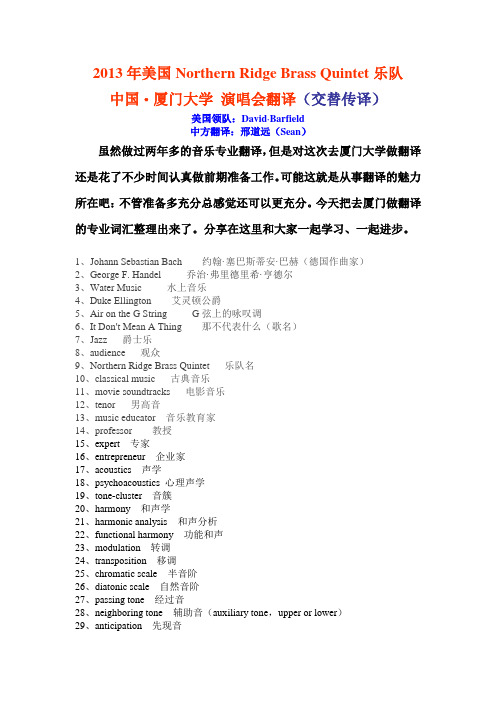
2013年美国Northern Ridge Brass Quintet乐队中国·厦门大学演唱会翻译(交替传译)美国领队:David·Barfield中方翻译:邢道远(Sean)虽然做过两年多的音乐专业翻译,但是对这次去厦门大学做翻译还是花了不少时间认真做前期准备工作。
可能这就是从事翻译的魅力所在吧:不管准备多充分总感觉还可以更充分。
今天把去厦门做翻译的专业词汇整理出来了。
分享在这里和大家一起学习、一起进步。
1、Johann Sebastian Bach 约翰·塞巴斯蒂安·巴赫(德国作曲家)2、George F. Handel 乔治·弗里德里希·亨德尔3、Water Music 水上音乐4、Duke Ellington 艾灵顿公爵5、Air on the G String G弦上的咏叹调6、It Don't Mean A Thing 那不代表什么(歌名)7、Jazz 爵士乐8、audience 观众9、Northern Ridge Brass Quintet 乐队名10、classical music 古典音乐11、movie soundtracks 电影音乐12、tenor 男高音13、music educator 音乐教育家14、professor 教授15、expert 专家16、entrepreneur 企业家17、acoustics 声学18、psychoacoustics 心理声学19、tone-cluster 音簇20、harmony 和声学21、harmonic analysis 和声分析22、functional harmony 功能和声23、modulation 转调24、transposition 移调25、chromatic scale 半音阶26、diatonic scale 自然音阶27、passing tone 经过音28、neighboring tone 辅助音(auxiliary tone,upper or lower)29、anticipation 先现音30、suspension 延留音31、ornament(s) 装饰音32、trill 颤音33、mordent 波音(upper mordent)34、inverted mordent 逆波音(lower mordent;早期称Schneller)35、double mordent 复波音36、inverted turn 回音37、arpeggio 琶音38、Renaissance 文艺复兴39、Rococo 洛可可40、Baroque 巴洛克41、Classicism 古典主义42、Romanticism 浪漫主义43、Impressionism 印象主义44、Nationalism in music 民族乐派45、Anti- impressionism 反印象主义46、Realism 现实主义47、Serialism 序列主义48、Primitivism 原始主义49、Expressionism 表现主义50、Microtonalism 微分音主义51、Neoclassicism 新古典主义52、Structuralism 结构主义53、Concrete Music 具体音乐54、Accidentalism 偶然主义55、Minimalism 省略(简约)主义56、Pointillism 点描派57、frequency 频率58、intensity 强度59、time 时间60、wave form 波形61、pitch 音高62、loudness 响度63、duration 时值64、timbre 音色(tone color or quality)65、tuning fork 音叉66、pure tone 纯音67、complex tone 复音(composite tone)68、overtone(s) 泛音(aliquot tone, harmonics, flageolet tone 即upper partials)69、overtone series 泛音列70、partial(s) 分音(partial tone)71、fundamental(tone) 基音(first partial)72、step 音级(scale step, degree)73、accidental(s) 变音记号74、sharp 升号75、flat 降号76、double-sharp 重升号77、double-flat 重降号78、nature 还原号79、intonation 音准80、octave 八度81、range 音域(compass)82、(voice) register 音区83、small c 小字组c84、great C 大字组C85、contra C 大字二组C86、unaccented octave 小字组87、one-lined octave 小字一组(one-line)88、two-lined octave 小字二组(two-line)89、three-lined octave 小字三组(three-line)90、four-line octave 小字四组(four-line)91、temperament 乐律92、tempered scale 平均律(equal temperament)93、just intonation 纯律94、pitch name 音名95、enharmonic notes 等音96、(whole) tone 全音97、half-tone 半音98、natural half-tone 自然半音99、natural tone 自然全音100、chromatic tone 变化全音101、chromatic half-tone 变化半音102、notation 记谱法103、staff 乐谱104、treble clef 高音谱号105、bass clef 低音谱号106、clef 谱号(G clef, F clef, C clef)107、note(s) 音符108、rest(s) 休止符109、breve 二全音符110、semibreve 全音符(whole note,美)111、minim 二分音符(half note,美)112、crotchet 四分音符(quarter note,美)113、quaver 八分音符(eighth note,美)114、semiquaver 十六分音符(sixteenth note,美)115、demisemiquaver 三十二分音符(thirty-second note,美) 116、hemidemisemi quaver 六十四分音符(sixty-fourth note,美) 117、dot 附点118、double dot 复附点119、dotted note 附点音符120、dotted rest 附点休止符121、score 总谱122、leger line(s) 加线(ledger line(s))123、head 符头124、stem 符干125、hook 符尾(tail)126、space 间127、line 线128、tie 延音线129、pause 延长号(hold, fermata)130、bar 小节(bar line小节线, measure)131、sight-singing 视唱132、fixed-do 固定唱名法133、movable-do 音调唱名法134、lyra 乐徽135、rhythm 节奏136、rhythmic pattern 节奏型137、accent 重音138、syncopation 切分音139、meter 拍子(time)140、duple meter(s) 二拍子(2/2,2/4,2/8)141、triple meter(s) 三拍子(3/2,3/4,3/8)142、quadruple meter(s) 四拍子(4/2,4/4,4/8)143、common meter 普通拍子(4/4)144、simple meter(s) 单拍子145、compound meter(s) 复拍子146、compound duple meter(s) 复二拍子(6/2,6/4,6/8)147、compound triple meter(s) 复三拍子(9/4,9/8)148、compound quadruple meter(s) 复四拍子(12/4,12/8,12/16) 149、quintuple meter 五拍子150、time signature 拍号151、multi-meter 变化拍子152、irregular meter (不规则)混合拍子(7/4,11/7)153、Metronome 节拍机(M.M.=Malzel’s ~)154、duplet 二连音155、triplet 三连音156、quadruplet 四连音157、quintuplet 五连音158、sextuplet 六连音159、septuplet 七连音160、tempo 速度161、dynamics 力度162、tempo mark(s) 速度标记163、dynamic mark(s) 力度标记164、mode 调式(狭指教会调式;广指调式)165、scale 音阶166、key 调167、tonality 调性168、atonality 无调性169、bitonality 双重调性170、polytonality 多调性171、major 大调172、minor 小调173、key signature 调号174、pentatonic 五声的175、natural 自然的176、melodic 旋律的177、harmonic 和声的178、whole-tone 全音的179、chromatic 半音的180、ascending 上行181、descending 下行182、scale degree (调式)音级183、tonic(I) 主音,主和弦184、supertonic(II) 上主音,上主和弦185、mediant (III) 中音,中音和弦186、subdominant(IV) 下属音,下属和弦187、dominant(V) 属音,属和弦188、submediant(VI) 下中音,下中音和弦(super-dominant) 189、leading tone(VII) 导音,导和弦(subtonic)190、broken chord 分解和弦191、altered chord 变和弦192、false chord 假和弦193、resolution 解决194、vibration 振动195、sound 音196、tone 音(乐音)197、musical tone 乐音198、noise 噪音199、relative keys 关系大小调200、parallel keys 同主音调201、interval 音程202、melodic interval 旋律音程203、harmonic interval 和声音程204、root 根音(fundamental)205、scale step 音级(音级数:number of scale step)206、simple interval 单音程207、compound interval 复音程208、enharmonic intervals 等音程209、inversion 转位(complement)210、minor 小(音程)211、major 大(音程)212、perfect 完全,纯(音程)213、augmented 增(音程)214、diminished 减(音程)215、double-augmented 倍增(音程)216、double-diminished 倍减(音程)217、unison 同度,一度(prime)218、second 二度219、third 三度220、fourth 四度221、fifth 五度222、sixth 六度223、seventh 七度224、octave 八度225、ninth 九度226、tenth 十度227、eleventh 十一度228、twelfth 十二度229、tri-tone 三全音230、diatonic interval 自然(音程)231、chromatic interval 变化(音程)232、consonant 协和(音程、和弦)233、dissonant 不协和(音程、和弦)234、chord 和弦235、triad 三和弦236、major triad 大三和弦237、minor triad 小三和弦238、diminished triad 减三和弦239、augmented triad 增三和弦240、root position 原位241、first inversion 第一转位242、second inversion 第二转位243、third inversion 第三转位244、sixth chord 六和弦245、sixth-four chord 四六和弦246、seventh chord 七和弦247、dominant seventh chord 属七和弦248、diminished seventh chord 减七和弦249、ninth chord 九和弦250、augmented sixth chord 增六和弦251、Added-sixth chord 加六度和弦252、fourth chord 四度和弦253、melody 旋律254、repetition 重复255、unity 统一256、variety 变化257、variation 变奏258、theme with variation 主题与变奏259、comparison 对比260、augmentation 展开261、climax 高潮262、sequence 模进263、melodic sequence 旋律模进264、harmonic sequence 和声模进265、melodic progression 旋律进行266、melodic contour 旋律轮廓267、motive 动机268、development 发展269、thematic material 主题材料270、phrase 乐句271、phrasing 分句272、period 乐段273、cadence 终止274、perfect cadence 完全终止275、imperfect cadence 不完全终止276、half cadence 半终止277、authentic cadence 正格终止278、plagal cadence 变格终止279、interrupted cadence 阻碍终止280、deceptive cadence 伪终止281、musical form 曲式282、one-part form 一段式,一部曲式283、binary form 二段式,二部曲式(AB)284、rounded binary form (有再现的)二段式285、ternary form 三段式,三部曲式(ABA)286、four-part form 四段式287、five-part form 五段式288、variation form 变奏曲式(A,A1,A2,A3…)strophic form 分节歌(a,a,a,a …)289、rondo form 回旋曲式(ABACA)290、sonata form 奏鸣曲式291、exposition 呈示部292、development 展开部293、recapitulation 再现部294、rondo sonata form 回旋奏鸣曲式295、movement 乐章296、prelude 前奏(曲)297、interlude 间奏(曲)298、coda 尾声299、trio 三声中部300、cadanza 华彩乐段301、musical form 体裁302、reduction 改编(缩编)303、trio 三重奏304、quartet 四重奏305、quintet 五重奏306、opera 歌剧307、ballet 芭蕾308、chorus 合唱309、choir 合唱团310、choral music 合唱音乐311、cantata 康塔塔312、mass 弥撒313、oratorio 清唱剧314、passion 受难曲315、symphony 交响曲316、concerto 协奏曲317、sonata 奏鸣曲318、sonatina 小奏鸣曲319、band 军乐队320、band music 军乐321、etude 练习曲322、march 进行曲323、jazz 爵士乐324、overture 序曲325、ballata 叙事曲326、inter mezzo 间奏曲327、waltz 圆舞曲,华尔兹328、allemande 阿勒曼德329、courante 库朗特330、sarabande 萨拉班德331、gigue 吉格332、bourree 布列333、polonaise 波洛涅兹334、tarantella 塔兰台拉335、govotte 加沃特336、chaconne 恰空337、passacaglia 帕萨卡利亚338、capriccio 随想曲339、fantasia 幻想曲340、lullaby 摇篮曲341、tango 探戈342、habanera 哈巴涅拉343、madrigal 牧歌344、choral 众赞歌345、reguiem 安魂曲346、symphonic poem 交响诗347、toccata 托卡塔348、serenade 小夜曲349、nocturn 夜曲350、rhapsody 狂想曲351、minuet 小步舞曲352、recitative 宣叙调353、aria 咏叹调354、songs without word 无词歌355、invention 创意曲356、scherzo 谐谑曲357、mazurka 玛祖卡358、polka 波尔卡359、fox trot 狐步舞360、blues 布鲁斯361、rumba 伦巴362、disco 迪斯科363、suite 组曲364、fugue 赋格365、instrumental music 器乐366、musical instrument 乐器367、instrumentation 乐器法368、orchestra 管弦乐队369、orchestration 配器法370、conductor 指挥371、concert master 首席372、podium 指挥台373、wood wind instruments 木管乐器374、piccolo 短笛375、flute 长笛376、oboe 双簧管377、clarinet 单簧管(黑管)378、bass clarinet 低音单簧管379、bassoon 大管(巴松)380、contrabassoon 低音大管381、English horn 英国管382、brass wind instruments 铜管乐器383、French horn 圆号,法国号384、trumpet 小号385、cornet 短号386、trombone 长号387、tuba 大号388、bass tuba 低音大号389、double bass tuba 倍低音大号390、tenor tuba 次中音大号391、bass 低音号392、saxophone 萨克斯管393、euphonium 尤风宁号394、percussion(s)打击乐395、kettle drum 定音鼓396、bass drum 大鼓397、tenor drum 中鼓398、side drum 小鼓399、triangle 三角铁400、chimes 排钟401、marimba 玛林巴402、tubular bells 管钟403、glockenspiel 钟琴404、vibraphone 颤音琴405、castanets 响板406、whip 鞭响器407、rattle 摇响器408、anvil 乐砧409、tambourine 铃鼓410、tabor 塔波鼓411、bongo 邦戈鼓412、gong 锣413、temple block 木鱼414、wood block 南梆子,盒梆415、cymbal 钹416、harp 竖琴417、xylophone 木琴418、piano 钢琴419、pedal 踏板420、stringed instruments 弦乐器421、violin 小提琴422、viola 中提琴423、cello 大提琴424、double bass 低音提琴425、guitar 吉他426、lute 疏特琴427、harpsichord 拨弦古钢琴428、clavier (18世纪)键盘乐器429、organ 风琴430、pipe organ 管风琴431、accordion 手风琴432、keyboard 键盘(乐)433、vocal music 声乐434、bel canto 美声435、a cappella 无伴奏合唱436、voice 人声,声部437、soprano 女高音438、coloratura soprano 花腔女高音439、lyric soprano 抒情女高音440、dramatic soprano 戏剧女高音441、mezzo soprano 次女高音,女中音442、dramatic tenor 戏剧男高音443、bariton 男中音444、bass 男低音445、unison 齐奏(唱)446、solo 独奏(唱)447、duet 二重奏448、ensemble 合奏(团体)449、stage 舞台450、theater 剧场,戏剧451、monophonic music 单声部音乐452、homophony 主调453、homophonic music 主调音乐454、polyphony 复调455、polyphonic music 复调音乐456、counterpoint 对位457、program music 标题音乐458、absolute music 纯音乐,非标题音乐459、abstract music 抽象音乐460、legato 连音,连奏461、staccato 断音,断奏462、sostenuto 持音463、trembolo 震音464、glissando 滑音465、relative pitch 相对音高(听觉)466、absolute pitch 绝对音高(听觉)。
古典音乐家人名翻译
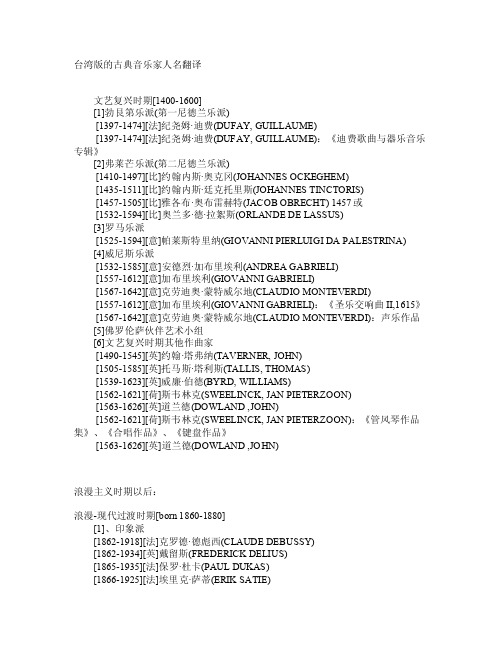
台湾版的古典音乐家人名翻译文艺复兴时期[1400-1600][1]勃艮第乐派(第一尼德兰乐派) [1397-1474][法]纪尧姆·迪费(DUF AY, G UILLA UME)[1397-1474][法]纪尧姆·迪费(D UFAY, GUIL LAUME):《迪费歌曲与器乐音乐专辑》[2]弗莱芒乐派(第二尼德兰乐派)[1410-1497][比]约翰内斯·奥克冈(JOH ANNES OCKE GHEM)[1435-1511][比]约翰内斯·廷克托里斯(J OHANN ES TI NCTOR IS) [1457-1505][比]雅各布·奥布雷赫特(JACO B OBR ECHT) 1457或[1532-1594][比]奥兰多·德·拉絮斯(O RLAND E DELASSU S)[3]罗马乐派 [1525-1594][意]帕莱斯特里纳(GIO VANNI PIER LUIGI DA P ALEST RINA) [4]威尼斯乐派[1532-1585][意]安德烈·加布里埃利(A NDREA GABR IELI)[1557-1612][意]加布里埃利(G IOVAN NI GA BRIEL I) [1567-1642][意]克劳迪奥·蒙特威尔地(CLAU DIO M ONTEV ERDI)[1557-1612][意]加布里埃利(G IOVAN NI GA BRIEL I):《圣乐交响曲II,1615》 [1567-1642][意]克劳迪奥·蒙特威尔地(CLA UDIOMONTE VERDI):声乐作品[5]佛罗伦萨伙伴艺术小组[6]文艺复兴时期其他作曲家[1490-1545][英]约翰·塔弗纳(T AVERN ER, J OHN)[1505-1585][英]托马斯·塔利斯(TALLI S, TH OMAS)[1539-1623][英]威廉·伯德(B YRD,WILLI AMS)[1562-1621][荷]斯韦林克(SWE ELINC K, JA N PIE TERZO ON) [1563-1626][英]道兰德(DOWLA ND ,J OHN)[1562-1621][荷]斯韦林克(SWE ELINC K, JA N PIE TERZO ON):《管风琴作品集》、《合唱作品》、《键盘作品》[1563-1626][英]道兰德(DO WLAND ,JOH N)浪漫主义时期以后:浪漫-现代过渡时期[bo rn 1860-1880][1]、印象派[1862-1918][法]克罗德·德彪西(CL AUDEDEBUS SY)[1862-1934][英]戴留斯(F REDER ICK D ELIUS)[1865-1935][法]保罗·杜卡(P AUL D UKAS)[1866-1925][法]埃里克·萨蒂(E RIK S ATIE)[1875-1937][法]莫里斯·拉威尔(MAURI CE RA VEL)[1876-1946][西]马努埃尔·德·法雅(MANU EL DE FALL A)[1879-1936][意]奥托里诺·雷斯庇基(O TTORI NO RE SPIGH I)[1883-1937][波]卡罗尔·西曼诺夫斯基(KAROL SZYM ANOWS KI)[1890-1962][法]伊贝尔(J ACQUE S IBE RT)[2]、浪漫现实主义[1861-1906][俄]阿连斯基(AREN SKY,ANTON)[1861-1926][俄]卡托瓦(CAT OIRE, GEOR GY)[1863-1937][法]皮尔纳(P IERNé, GAB RIEL)[1864-1935][挪]哈尔沃森(HAL VORSE N, JO HAN)[1864-1936][丹]路易斯·格拉斯(G LASS, LOUI S)[1864-1956][俄]格列恰尼诺夫(GRET CHANI NOV,ALEXA NDER) [1865-1914][法]马尼亚尔(MAG NARD, ALBéRIC)[1866-1901][俄]卡林尼科夫(KAL INNIK OV, V ASILY)[1867-1942][典]彼得森-伯格(PETER SON-B ERGER, WIL HELM)[1867-1950][法]凯什兰(KOEC HLIN, CHAR LES)[1868-1948][葡]维阿纳·达·莫塔(VIANN A DAMOTTA, JOSé) [1860-1908][美]麦克道威尔(MACDO WELL, EDWA RD)[1860-1911][奥]古斯塔夫·马勒(GU STAVMAHLE R)[1860-1945][奥]雷兹尼莱克(EMILVON R EZNIC EK)[1864-1949][德]理查德·斯特劳斯(R ICHAR D STR AUSS)[1866-1924][意]布索尼(BUSO NI, F ERRUC CIO)[1873-1943][俄]谢尔盖·瓦西里耶维奇·拉赫玛尼诺夫(S ERGEI VASS ILIEV ITCHRACHM ANINO FF)[1903-1978][苏]阿拉姆·伊里奇·哈恰图良(AR AM IL ITCHKHATC HATUR IAN)[1904-1987][俄]卡巴列夫斯基(KA BALEV SKY)[3]、浪漫-现代过渡时期其他作曲家[1872-1956][俄]瓦西连科(VASIL ENKO, SERG EI)[1872-1960][典]阿尔芬(A LFVéN, HUG O)[1873-1945][俄]尼古拉·齐尔品(TCH EREPN IN, N IKOLA I)[1874-1939][奥]弗朗兹·施密特(SCH MIDT, FRAN Z)[1877-1952][乌]波特凯维茨(BORTK IEWIC Z, SE RGEI)[1878-1934][奥]施雷克尔(SCH REKER, FRA NZ)[1880-1951][俄]梅特纳(M EDTNE R, NI COLAI)[1866-1914][典]奥林(TORAULIN)[1867-1948][意]焦尔达诺(GI ORDAN O, UM BERTO)[1869-1949][德]普菲茨纳(PF ITZNE R, HA NS)[1871-1942][德]策姆林斯基(ZEML INSKY, ALE XANDE R VON) [1872-1927][典]威廉·施丹哈默(STEN HAMMA R, WI LHELM)[1873-1916][德]雷格(REGE R, MA X)[1875-1954][俄]格里埃尔(G LIéRE, REI NHOLD)二十世纪现代音乐时期[1900-2000][01]新古典主义(新巴洛克)(NE OCLAS SICIS M)[1869-1937][法]鲁塞尔(AL BERTROUSS EL)[1876-1948][意]埃尔曼诺·沃尔夫·费拉里(ER MANNO WOLF FERR ARI)[1882-1971][俄]伊戈尔·菲德洛维奇·斯特拉文斯基(IG OR FE DOROV ITCHSTRAV INSKY)[1883-1947][意]卡塞拉(ALF REDOCASEL LA)[1891-1953][俄]谢尔盖·普罗科菲耶夫(SERG EI PR OKOFI EV)[1895-1963][德]保罗·欣德米特(PA UL HI NDEMI TH)[1895-1982][德]卡尔·奥尔夫(CAR L ORF F)[1906-1975][苏]德米特里·德米特里耶维奇·肖斯塔科维奇(D MITRYDMIT RIEVI TCH S HOSTA KOVIT CH)[1909-1996][丹]霍尔姆波(HOLMB OE, V AGN)[1913-1994][波]鲁托斯拉夫斯基(W ITOLD LUTO S?AWS KI)[02]新浪漫主义(N EOROM ANTIC ISM)[1896-1982][美]汉森(H OWARD HANS ON)[1896-1989][美]维吉尔·汤姆森(VI RGILTHOMS ON)[1905-1998][英]蒂皮特(M ICHAE L TIP PETT)[1925-2003][意]贝里奥(LUCI ANO,BERIO)[03]新民族乐派[1854-1928][捷]雅那切克(LE OS JA NACEK)[1872-1958][英]沃恩·威廉斯(RALPH VAUG HAN W ILLIA MS)[1874-1934][英]霍尔斯特(GUSTA V THE ODORE HOLS T) [1874-1954][美]艾夫斯(CH ARLES EDWAR D, IV ES)[1881-1945][匈]贝拉·巴托克(BEL A BAR TOK)[1882-1961][澳]格兰杰(GRAIN GER,PERCY)[1882-1967][匈]柯达伊(KOD ALY Z OLTAN)[1901-1999][西]罗德里戈(RO DRIGO, JOA QUIN)[1902-1983][英]威廉·沃尔顿(W ILLIA M WAL TON)[1913-1976][英]本杰明·布里顿(B ENJAM IN BR ITTEN)[04]法国六人团(LES SIX)[1888-1979][法]迪雷(LOUIS DURE Y)[1892-1955][瑞]阿瑟·奥涅格(AUTH UR HO NEGGE R)[1892-1974][法]米约(DAR IUS M ILHAU D)[1892-1983][法]泰费尔(GE RMAIN E TAI LLEFE RRE)[1899-1963][法]普朗克(FRANC IS PO ULENC)[1899-1983][法]奥里克(GEO RGESAURIC)[05]象征主义[1872-1915][俄]史克里亚宾(AL EXAND ER SC RIABI N) [1881-1944][俄]罗斯拉维兹(NIKOL AI RO SLAVE TS)[06]表现主义(无调性,新维也纳乐派)[1874-1951][奥]奥诺德·勋柏格(A UNOLD SCHO NBERG)[1883-1945][奥]安东?韦伯恩(ANTON WEBE RN)[1885-1935][奥]贝尔格(B ERG A LBAN)[07]先锋派[1883-1965][法]瓦雷兹(E DGARVARèS E)[1908-1992][法]梅西安(OL IVIER MESS IAEN)[1916-][法]杜蒂耶(HE NRI D UTILL EUX)[1934-][英]贝特威斯尔(HA RRISO N BIR TWIST LE)[1934-][英]马克斯韦尔·戴维斯(SIRPETER MAXW ELL D AVIES) [08]爵士风格作曲家[1898-1937][美]乔治·格什温(GEO RGE G ERSHW IN)[1930-][法]克劳德·波林(CL AUDEBOLLI NG)[09]简约主义(MI NIMAL ISM)[1935-][美]拉蒙特·扬(LA MONT E YOU NG)[1935-][美]赖利(T ERRYRILEY)[1936-][美]史蒂夫?里奇(STEV E REI CH)[1937-][美]菲利普·格拉斯(P HILIP GLAS S)[1944-][英]迈克尔?纽曼(MIC HAELNYMAN)[1947-][美]约翰·亚当斯(JOHN COOL IDGEADAMS)[10]偶然音乐(ALEA TORIC MUSI C)[1912-][美]约翰·凯奇(JOHN CAGE)[1926-][德]亨策(HAN S WER NER H ENZE)[1928-][德]施托克豪森(K ARLHE INZ,STOCK HAUSE N) [11]神圣简约主义(H OLY M INIMA LISM)[1911-2000][美籍亚美尼亚]阿兰·霍夫哈奈斯(ALAN HOVH ANESS) [1933-][波]亨里克·戈莱斯基(GóRECKI, HEN RYK)[1935-][俄]阿弗?帕特(AR VO P?RT)[1944-][英]约翰·肯尼思·塔文纳(SIR JOHN KENN ETH T AVENE R) [1946-][拉脱维亚]瓦斯克斯(PēTERIS VASK S)。
古典音乐作曲家列表

古典音乐作曲家列表这是古典音乐作曲家列表的索引,按作曲家英文姓氏的首字母排序。
A卡尔·弗里德里希·阿贝尔(Abel, Carl Friedrich)让·阿布西尔(Absil, Jean)阿道夫·亚当(Adam, Adolphe)约翰·亚当斯(Adams, John)耶罕·阿兰(Alain, Jehan)伊萨克·阿尔贝尼兹(Albéniz, Isaac)欧根·达尔伯特(d'Albert, Eugen)托马索·阿尔比诺尼(Albinoni, Tomaso)约翰·格奥尔格·阿尔布雷希茨贝格(Albrechtsberger, Johann Georg)雨果·阿尔芬(Alfvén, Hugo)夏尔-瓦朗坦·阿尔康(Alkan, Charles-Valentin)安东·阿连斯基(Arensky, Anton)马尔科姆·阿诺德(Arnold, Malcolm)胡安·克里索斯托莫·阿里亚加(Arriaga, Juan Crisóstomo)亚历山大·阿鲁秋年(Arutiunian, Alexander)鲍里斯·阿萨菲耶夫(Asafyev, Boris)库特·阿特伯格(Atterberg, Kurt)丹尼尔·奥柏(Auber, Daniel)乔治·奥里克(Auric, Georges)查尔斯·阿维森(Avison, Charles)B米尔顿·巴比特(Babbitt, Milton)格拉奇娜·巴切维茨(Bacewicz, Grażyna)卡尔·菲利普·埃曼努埃尔·巴赫(Bach, Carl Philipp Emanuel)约翰·克里斯蒂安·巴赫(Bach, Johann Christian)约翰·克里斯托弗·弗里德里希·巴赫(Bach, Johann Christoph Friedrich)约翰·塞巴斯蒂安·巴赫(Bach, Johann Sebastian)威廉·弗里德曼·巴赫(Bach, Wilhelm Friedemann)阿加特·巴克-格伦达尔(Backer-Grøndahl, Agathe)米利·巴拉基列夫(Balakirev, Mily)迈克尔·威廉·巴尔夫(Balfe, Michael William)格兰维尔·班托克(Bantock, Granville)塞缪尔·巴伯(Barber, Samuel)沃尔德马尔·巴吉尔(Bargiel, Woldemar)奥古斯丁·巴里奥斯(Barrios, Agustín)巴托克·贝拉(Bartók, Béla)阿诺德·巴克斯(Bax, Arnold)艾米·比奇(Beach, Amy)路德维希·范·贝多芬(Beethoven, Ludwig Van)温琴佐·贝利尼(Bellini, Vincenzo)弗朗兹·本达(Benda, Franz)格奥尔格·安东·本达(Benda, Georg Anton)阿瑟·本杰明(Benjamin, Arthur)彼得·伯努瓦(Benoit, Peter)阿尔班·贝尔格(Berg, Alban)卢西亚诺·贝里奥(Berio, Luciano)夏尔·德·贝里奥(Beriot, Charles de)埃克托·柏辽兹(Berlioz, Hector)伦纳德·伯恩斯坦(Bernstein, Leonard)弗朗兹·贝瓦尔德(Berwald, Franz)费迪南德·拜厄(Beyer, Ferdinand)海因里希·比贝尔(Biber, Heinrich Ignaz)吉尔·班舒瓦(Binchois, Gilles)乔治·比才(Bizet, Georges)阿瑟·布利斯(Bliss, Arthur)欧内斯特·布洛赫(Bloch, Ernest)路易吉·博凯里尼(Boccherini, Luigi)莱昂·波尔曼(Boèllmann, Léon)弗朗索瓦-阿德里安·布瓦尔迪厄(Boieldieu, François-Adrien)阿里格·博伊托(Boito, Arrigo)若奥·多明戈·彭坦波(Bomtempo, João Domingos)安东尼奥·马利亚·博农奇尼(Bononcini, Antonio Maria)亚历山大·鲍罗丁(Borodin, Alexander)谢尔盖·波特凯维茨(Bortkiewicz, Sergei)德米特里·博尔特尼扬斯基(Bortniansky, Dmitry)乔瓦尼·博泰西尼(Bottesini, Giovanni)约克·鲍文(Bowen, York)威廉·博伊斯(Boyce, William)莉莉·布朗热(Boulanger, Nadia)娜迪亚·布朗热(Boulanger, Nadia)皮埃尔·布列兹(Boulez, Pierre)约翰内斯·勃拉姆斯(Brahms, Johannes)弗兰克·布里奇(Bridge, Franck)本杰明·布里顿(Britten, Benjamin)弗朗蒂舍克·布里克西(Brixi, František)莱奥·布劳威尔(Brouwer, Leo)马克斯·布鲁赫(Bruch, Max)安东·布鲁克纳(Bruckner, Anton)弗里德里希·布尔格缪勒(Burgmüller, Friedrich)诺伯特·布尔格缪勒(Burgmüller, Norbert)费卢西奥·布索尼(Busoni, Ferruccio)迪特里希·布克斯特胡德(Buxtehude, Dietrich)威廉·伯德(Byrd, William)C约翰·凯奇(Cage, John)安德烈·坎普拉(Campra, André)约瑟夫·康特卢布(Canteloube, Joseph)安德烈·卡普莱(Caplet, André)查尔斯·卡米莱里(Carmilleri, Charles)埃德温·卡尔(Carr, Edwin)艾略特·卡特(Carter, Elliott)帕布罗·卡萨尔斯(Casals, Pablo)阿尔弗雷多·卡塞拉(Casella, Alfredo)马里奥·卡斯泰尔诺沃-泰代斯科(Castelnuovo-Tedesco, Mario)乔治·卡托瓦(Catoire, Georgy)亚历杭德罗·加西亚·卡图尔拉(Caturla, Alejandro García)埃马纽埃尔·夏布里埃(Chabrier, Alexis-Emmanuel)乔治·查德威克(Chadwick, George)塞西莉·夏米娜德(Chaminade, Cécile)古斯塔夫·夏庞蒂埃(Charpentier, Gustave)欧内斯特·肖松(Chausson, Ernest)卡洛斯·查维斯(Chávez, Carlos)陈其钢(Chen, Qigang)陈怡(Chen, Yi)路易吉·凯鲁比尼(Cherubini, Luigi)弗雷德里克·肖邦(Chopin, Frédéric)周文中(Chou, Wen-chung)多米尼科·奇马罗萨(Cimarosa, Domenico)穆齐奥·克莱门蒂(Clementi, Muzio)帕斯科·科拉斯(Collasse, Pascal)阿隆·科普兰(Copland, Aaron)阿尔坎杰罗·科雷利(Corelli, Arcangelo)约翰·科里利亚诺(Corigliano, John)彼得·科内利乌斯(Cornelius, Peter)弗朗索瓦·库普兰(Couperin, Francois)亨利·考埃尔(Cowell, Henry)让·克哈斯(Cras, Jean)威廉·克罗夫特(Croft, William)伯恩哈德·亨里克·克鲁赛尔(Crusell, Bernhard Henrik)塞萨尔·居伊(Cui, César)卡尔·车尔尼(Czerny, Carl)D路易吉·达拉皮科拉(Dallapiccola, Luigi)弗朗兹·但齐(Danzi, Franz)亚历山大·达尔戈梅日斯基(Dargomyzhsky, Alexander)卡尔·达维多夫(Davidov, Karl)克劳德·德彪西(Debussy, Claude)米歇尔·理查德·德拉兰德(Delalande, Michael Richard)利奥·德里布(Délibes, Léo)弗雷德里克·戴留斯(Delius, Frederick)爱迪生·杰尼索夫(Denisov, Edison)安德烈·卡迪纳·德图什(Destouches, André Cardinal)安东·迪亚贝利(Diabelli, Anton)阿尔丰斯·迪彭布罗克(Diepenbrock, Alphons)卡尔·冯·迪特斯多夫(Dittersdorf, Carl von)多赫南伊·埃尔诺(Dohnanyi, Ernő)葛塔诺·多尼采蒂(Donizetti, Gaetano)约翰·道兰德(Dowland, John)费利克斯·德莱塞克(Draeseke, Felix)皮埃尔·马克斯·杜布瓦(Dubois, Pierre Max)提奥多·杜布瓦(Dubois, Théodore)纪尧姆·迪费(Dufay, Guillaume)保罗·杜卡斯(Dukas, Paul)马塞尔·迪普雷(Dupré, Marcel)路易·迪雷(Durey, Louis)弗朗蒂舍克·克萨韦尔·杜舍克(Dušek, František Xaver)扬·拉迪斯拉夫·杜舍克(Dussek, Jan Ladislav)巴里斯·德瓦利奥纳斯(Dvarionas, Balys)安东宁·德沃夏克(Dvorák, Antonín)亨利·迪帕克(Duparc, Henri)莫里斯·迪吕弗莱(Duruflé, Maurice)E汉斯·艾斯勒(Eisler, Hanns)爱德华·埃尔加(Elgar, Edward)莫里斯·埃马努埃尔(Emmanuel, Maurice)乔治·埃内斯库(Enescu, George)艾凯尔·费伦茨(Erkel, Ferenc)海因里希·威尔海姆·恩斯特(Ernst, Heinrich Wilheim)F曼努埃尔·德·法利亚(Falla, Manuel de)加布里埃尔·福莱(Fauré, Gabriel)兹德涅克·菲比赫(Fibich, Zdeněk)约翰·菲尔德(Field, John)弗里德里希·冯·弗洛托(Flotow, Friedrich von)约瑟夫·博胡斯拉夫·费尔斯特(Foerster, Josef Bohuslav)阿瑟·富特(Foote, Arthur)约翰·福尔兹(Foulds, John)塞扎尔·弗兰克(Franck, César)腓特烈二世(Friedrich II)威廉·亨利·弗赖(Fry, William Henry)罗伯特·富克斯(Fuchs, Robert)威尔海姆·富特文格勒(Furtwängler, Wilhelm)约翰·约瑟夫·富克斯(Fux, Johann Joseph)G安德烈·加布里埃利(Gabrieli, Andrea)乔万尼·加布里埃利(Gabrieli, Giovanni)尼尔斯·加德(Gade, Niels)罗伯托·格哈德(Gerhard, Robert)卡洛·杰苏阿尔多(Gesualdo, Carlo)乔治·格什温(Gershwin, George)阿尔伯托·希纳斯特拉(Ginastera, Alberto)翁贝托·焦尔达诺(Giordano, Umberto)菲利普·格拉斯(Glass, Philip)路易斯·格拉斯(Glass, Louis)亚历山大·格拉祖诺夫(Glazunov, Alexander)莱因霍尔德·格里埃尔(Gliére, Reinhold)米哈依尔·伊万诺维奇·格林卡(Glinka, Mikhail)克里斯托夫·维利巴尔德·格鲁克(Gluck, Christoph Willibald)本杰明·戈达(Godard, Benjamin)利奥波德·戈多夫斯基(Godowsky, Leopold)赫尔曼·格茨(Goetz, Hermann)卡尔·戈德马克(Goldmark, Karl)亨里克·戈雷斯基(Górecki, Henryk)弗朗索瓦-约瑟夫·戈塞克(Gossec, François-Joseph)雅科夫·戈托瓦茨(Gotovac, Jakov)路易斯·莫罗·戈特沙尔克(Gottschalk, Louis Moreau)夏尔·古诺(Gounod, Charles)珀西·格兰杰(Grainger, Percy)恩里克·格拉纳多斯(Granados, Enrique)卡尔·海因里希·格劳恩(Graun, Karl Heinrich)亚历山大·格列恰尼诺夫(Grechaninov, Alexander)阿图尔·德·格里夫(Greef, Arthur de)爱德华·格里格(Grieg, Edvard)查尔斯·格里费斯(Griffes, Charles)莫扎特·卡马戈·瓜尼埃里(Guarnieri, Mozart Camargo)卡洛斯·瓜斯塔维诺(Guastavino, Carlos)索菲娅·古拜杜丽娜(Gubaidulina, Sofia)亚历山大·吉尔芒(Guilmant, Alexandre)郭文景(Guo, Wenjing)阿达尔伯特·吉罗维茨(Gyrowetz, Adalbert)H帕维尔·哈斯(Haas, Pavel)阿洛伊斯·哈巴(Hába, Alois)雷纳尔多·哈恩(Hahn, Reynaldo)雅克·弗洛蒙塔尔·阿莱维(Halévy, Jacques Fromental)约翰·哈尔沃森(Halvorsen, Johan)阿斯格尔·哈梅里克(Hamerik, Asger)格奥尔格·弗里德里希·亨德尔(Handel, George Frideric)夏尔-路易·哈农(Hanon, Charles-Louis)霍华德·汉森(Hanson, Howard)约翰·哈比森(Harbison, John)罗伊·哈里斯(Harris, Roy)约翰·彼得·埃米琉斯·哈特曼(Hartmann, Johan Peter Emilius)卡尔·阿玛德乌斯·哈特曼(Hartmann, Karl Amadeus)汉密尔顿·哈蒂(Harty, Hamilton)约翰·阿道夫·哈塞(Hasse, Johann Adolph)约瑟夫·马蒂亚斯·豪尔(Hauer, Josef Matthias)约瑟夫·海顿(Haydn, Joseph)米歇尔·海顿(Haydn, Michael)贺绿汀(He, Lüting)斯蒂芬·海勒(Heller, Stephen)阿道夫·冯·亨泽尔特(Henselt, Adolf von)汉斯·维尔纳·亨策(Henze, Hans Werner)威廉·赫歇尔(Herschel, William)费迪南·埃罗尔德(Hérold, Ferdinand)海因里希·冯·赫尔佐根伯格(Herzogenberg, Heinrich von)宾根的希尔德加德(Hildegard von Bingen)阿尔弗雷德·希尔(Hill, Alfred)费迪南·希勒(Hiller, Ferdinand)保罗·欣德米特(Hindemith,Paul)沃恩·霍尔姆波(Holmboe, Vagn)古斯塔夫·霍尔斯特(Holst, Gustav)阿图尔·奥乃格(Honegger, Arthur)阿兰·霍夫哈奈斯(Hovhaness, Alan)萧泰然(Hsiao, Tyzen)黄自(Huang, Zi)汉斯·胡伯(Huber, Hans)约翰·尼波默克·胡梅尔(Hummel, Johann Nepomuk)恩格尔贝特·洪佩尔丁克(Humperdinck, Engelbert)I雅克·伊贝尔(Ibert, Jacques)伊福部昭(Ifukube, Akira)樊尚·丹第(D'Indy, Vincent)约翰·艾尔兰(Ireland, John)查尔斯·艾夫斯(Ives, Charles)米哈伊尔·伊波里托夫-伊凡诺夫(Ippolitov-Ivanov, Mikhail)J萨洛蒙·雅达松(Jadassohn, Salomon)莱奥什·雅纳切克(Janáček, Leoš)克莱门特·雅内坎(Janequin, Clément)江文也(Jiang, Wenye)约瑟夫·约阿希姆(Joachim, Joseph)安德烈·若利韦(Jolivet, André)约瑟夫·戎冈(Jongen, Joseph)若斯坎·德普雷(Josquin des Prez)K德米特里·卡巴列夫斯基(Kabalevsky, Dmitri)罗伯特·卡亚努斯(Kajanus, Robert)瓦西里·卡林尼科夫(Kalinnikov, Vasily)扬·卡利沃达(Kalivoda, Jan)弗里德里希·卡尔克布雷纳(Kalkbrenner, Friedrich)马诺利斯·卡洛米里斯(Kalomiris, Manolis)齐格弗里德·卡格-埃勒特(Karg-Elert, Sigfrid)米奇斯拉夫·卡洛维茨(Karłowicz, Mieczysław)阿尔伯特·凯特尔比(Ketèlbey, Albert William)阿拉姆·哈恰图良(Khachaturian, Aram)吉洪·赫连尼科夫(Khrennikov, Tikhon)沃伊切赫·基拉尔(Kilar, Wojciech)乌诺·克拉米(Klami, Uuno)朱利叶斯·克伦格尔(Klengel, Julius)柯达伊·佐尔坦(Kodály, Zoltán)夏尔·凯什兰(Koechlin, Charles)埃里希·科恩戈尔德(Korngold, Erich Wolfgang)列奥波德·科策卢(Kozeluch, Leopold)约瑟夫·马丁·克劳斯(Kraus, Joseph Martin)弗里茨·克莱斯勒(Kreisler, Fritz)恩斯特·克热内克(Krenek, Ernst)弗朗兹·克罗默尔(Krommer, Franz)弗里德里希·库劳(Kuhlau, Friedrich)库塔格·捷尔吉(Kurtág, György)L爱德华·拉罗(Lalo, Edouard)乌埃德·兰戛尔(Langgaard, Rued)约瑟夫·兰纳(Lanner, Joseph)奥兰多·德·拉絮斯,又名拉索(Lassus, Orlando di(Lasso))让-玛丽·勒克莱尔(Leclair, Jean-Marie)埃内斯托·莱库纳(Lecuona, Ernesto)弗朗兹·莱哈尔(Lehár, Franz)琼·莱夫斯(Leifs, Jón)纪尧姆·勒克(Lekeu, Guillaume)鲁杰罗·莱翁卡瓦洛(Leoncavallo, Ruggiero)提奥多·莱谢蒂茨基(Leschetizky, Theodor)李焕之(Li, Huanzhi)利盖蒂·捷尔吉(Ligeti, Gyorgy)道格拉斯·利尔本(Lilburn, Douglas)弗朗兹·李斯特(Liszt, Franz)马修·洛克(Locke, Matthew)卡尔·勒韦(Loewe, Carl)阿尔伯特·洛尔青(Lortzing, Albert)路易·斐迪南亲王(Prince Louis Ferdinand of Prussia)让-巴普蒂斯特·吕利(Lully, Jean-Baptiste)维托尔德·卢托斯瓦夫斯基(Lutoslawski, Witold)阿纳托利·里亚多夫(Lyadov, Anatoly)谢尔盖·利亚普诺夫(Lyapunov, Sergei)鲍里斯·利亚托申斯基(Lyatoshynsky, Borys)M马思聪(Ma, Sicong)爱德华·麦克道威尔(Macdowell, Edward)纪尧姆·德·马肖(Machaut, Guillaume de)里维·马代托亚(Madetoja, Leevi)阿尔伯里克·马尼亚尔(Magnard, Albéric)古斯塔夫·马勒(Mahler, Gustav)吉安·弗朗西斯科·马利皮耶罗(Malipiero, Gian Francesco)伊戈尔·马克维奇(Markevitch, Igor)安托万·弗朗索瓦·马蒙泰尔(Marm ontel, Antoine François)海因里希·马施纳(Marschner, Heinrich)乔凡尼·巴蒂斯塔·马蒂尼(Martini, Giovanni Battista)弗兰克·马丁(Martin, Frank)比森特·马丁-索勒(Martín y Soler, Vicente)博胡斯拉夫·马尔蒂努(Martinů, Bohuslav)朱塞佩·马尔图齐(Martucci, Giuseppi)约瑟夫·马克思(Marx, Joseph)皮埃特罗·马斯卡尼(Mascagni, Pietro)儒勒·马斯内(Massenet, Jules)彼得·马克斯韦尔·戴维斯(Maxwell Davies, Peter)尼古拉·梅特纳(Medtner, Nicolai)约翰·德·梅杰(Meij, Johan de)埃尔基·梅拉尔丁(Melartin, Erkki)范妮·门德尔松(Mendelssohn, Fanny)费利克斯·门德尔松(Mendelssohn, Felix)吉安·卡洛·梅诺蒂(Menotti, Gian Carlo)阿尔·梅利康托(Merikanto, Aarre)奥斯卡·梅利康托(Merikanto, Oskar)安德烈·梅萨热(Messager, André)奥立佛·梅西安(Messiaen, Olivier)贾科莫·梅耶贝尔(Meyerbeer, Giacomo)弗朗西斯科·米戈农(Mignone, Francisco)达律斯·米约(Milhaud, Darius)路德维希·明库斯(Minkus, Ludwig)费德里科·蒙波(Mompou, Federico)让-约瑟夫·卡桑尼·德·蒙东维尔(Mondonville, Jean-Joseph Cassanea de)斯坦尼斯拉夫·莫纽什科(Moniuszko, Stanislaw)克劳迪奥·蒙特威尔第(Monteverdi, Claudio)伊格纳兹·莫谢莱斯(Moscheles, Ignaz)亚历山大·莫索洛夫(Mosolov, Alexander)莫里茨·莫什科夫斯基(Moszkowski, Moritz)利奥波德·莫扎特(Leopold, Mozart)沃尔夫冈·阿玛迪乌斯·莫扎特(Mozart, Wolfgang Amadeus)弗朗兹·克萨韦尔·沃尔夫冈·莫扎特(Mozart, Franz Xaver Wolfgang)莫杰斯特·彼得罗维奇·穆索尔斯基(Mussorgsky, Modest)尼古拉·米亚斯科夫斯基(Myaskovsky, Nicolai)约瑟夫·米斯利维切克(Mysliveček, Josef)N奥托·尼古拉(Nicolai, Otto)卡尔·尼尔森(Nielsen, Carl)路易吉·诺诺(Nono, Luigi)齐格蒙特·诺斯科夫斯基(Noskowski, Zygmunt)维捷斯拉夫·诺瓦克(Novák, Vítězslav)珀尔·纳尔戈尔(Nørgård, Per)O雅各布·奥布雷赫特(Obrecht, Jacob)约翰内斯·奥克冈(Ockeghem, Johannes)雅克·奥芬巴赫(Offenbach, Jacques)乔治·翁斯洛(Onslow, George)卡尔·奥尔夫(Orff, Carl)P约翰·帕赫贝尔(Pachelbel, Johann)伊格纳奇·扬·帕德雷夫斯基(Paderewski, Ignacy Jan)约翰·诺尔斯·佩因(Paine, John Knowles)乔万尼·帕伊谢洛(Paisiello, Giovanni)塞利姆·帕姆格伦(Palmgren, Selim)安德热·帕努夫尼克(Panufnik, Andrzej)霍雷肖·帕克(Parker, Horatio)休伯特·帕里(Parry, Hubert)阿沃·帕特(Pärt, Arvo)尼可罗·帕格尼尼(Paganini, Niccolo)乔万尼·帕莱斯特里纳(Palestrina, Giovanni Pierluigi da)费利佩·佩德雷尔(Pedrell, Felip)克里斯托弗·潘德列茨基(Penderecki, Krzysztof)乔瓦尼·巴蒂斯塔·佩尔戈莱西(Pergolesi, Giovanni Battista)威尔海姆·彼得森-伯格(Peterson-Berger, Wilhelm)阿兰·佩特森(Pettersson, Allan)汉斯·普菲茨纳(Pfitzner, Hans)弗朗索瓦-安德烈·丹尼根·菲利多尔(Philidor, François-André Danican)加布里埃尔·皮尔纳(Pierné, Gabriel)威廉·皮佩尔(Pijper, Willem)瓦尔特·辟斯顿(Piston, Walter)伊尔代布兰多·皮泽蒂(Pizzetti, Ildebrando)伊格纳兹·普莱耶尔(Pleyel, Ignaz)曼努埃尔·庞塞(Ponce, Manuel)大卫·波佩尔(Popper, David)弗朗西斯·普朗克(Poulenc, Francis)谢尔盖·普罗科菲耶夫(Prokofiev, Sergey)贾科莫·普契尼(Puccini, Giacomo)亨利·珀塞尔(Purcell, Henry)Q瞿小松(Qu, Xiao-song)R谢尔盖·拉赫玛尼诺夫(Rachmaninoff, Sergei)约阿希姆·拉夫(Raff, Joachim)让-菲利普·拉莫(Rameau, Jean-Philippe)莫里斯·拉威尔(Ravel, Maurice)埃诺约哈尼·劳塔瓦拉(Rautavaara, Einojuhani)马克斯·雷格(Reger, Max)斯蒂夫·莱奇(Reich, Steve)安东·雷哈(Reicha, Anton)卡尔·赖内克(Reinecke, Carl)奥托里诺·雷斯庇基(Respighi, Ottorino)西尔维斯特里·雷维尔塔斯(Revueltas, Silvestre)艾米尔·冯·雷兹尼克(Reznicek, Emil von)约瑟夫·赖因贝格尔(Rheinberger, Joseph)弗朗兹·克萨韦尔·里赫特(Richter, Franz Xaver)费迪南德·里斯(Ries, Ferdinand)沃尔夫冈·里姆(Rihm, Wolfgang)特里·赖利(Riley, Terry)尼古拉·里姆斯基-科萨科夫(Rimsky-Korsakov, Nikolai)华金·罗德里戈(Rodrigo, Joaquin)阿马德奥·罗尔丹(Roldán, Amadeo)朱利叶斯·隆特根(Röntgen, Julius)居伊·罗帕茨(Ropartz, Guy)胡文蒂诺·罗萨斯(Rosas, Juventino)安东尼奥·罗塞蒂(Rosetti, Antonio)尼古拉·罗斯拉维茨(Roslavets, Nicolai)焦阿基诺·罗西尼(Rossini, Gioachino)尼诺·罗塔(Rota, Nino)汉斯·罗特(Rott, Hans)阿尔伯特·鲁塞尔(Roussel, Albert)罗饶·米克罗斯(Rózsa, Miklós)安东·鲁宾斯坦(Rubinstein, Anton)尼古拉·鲁宾斯坦(Rubinstein, Nikolai)卡尔·拉格尔斯(Ruggles, Carl)约翰·鲁特(Rutter, John)雅各布·扬·莱巴(Ryba, Jakub Jan)S哈拉尔·萨弗鲁德(Sæverud, Harald)卡米尔·圣桑(Saint-Saèns, Camille)安东尼奥·萨列里(Salieri, Antonio)奥利斯·萨利南(Sallinen, Aulis)乔万尼·巴蒂斯塔·萨马丁尼(Sammartini, Giovanni Battista)帕布罗·德·萨拉萨蒂(Sarasate, Pablo)埃里克·萨蒂(Satie, Erik)艾赫迈德·阿德南·赛贡(Saygun, Ahmed Adnan)亚历山德罗·斯卡拉蒂(Scarlatti, Alessandro)多梅尼科·斯卡拉蒂(Scarlatti, Domenico)克萨韦尔·沙尔文卡(Scharwenka, Xaver)萨缪尔·沙伊特(Scheidt, Samuel)马克斯·冯·席林斯(Schillings, Max von)约翰·海因里希·施梅尔策(Schmelzer, Johann Heinrich)弗朗兹·施密特(Schmidt, Franz)弗洛朗·施米特(Schmitt, Florent)阿尔弗雷德·施尼特凯(Schnittke, Alfred)奥特马·舍克(Schoeck, Othmar)阿诺德·勋伯格(Schoenberg, Arnold)弗朗兹·施雷克尔(Schreker, Franz)弗朗兹·舒伯特(Schubert, Franz)埃尔文·舒尔霍夫(Schulhoff, Erwin)克拉拉·舒曼(Schumann, Clara)罗伯特·舒曼(Schumann, Robert)威廉·舒曼(Schuman, William)海因里希·许茨(Schütz, Heinrich)亚历山大·斯克里亚宾(Scriabin, Alexander)朱利安·斯克里亚宾(Scriabin, Julian)彼得·斯克尔索普(Sculthorpe, Peter)卡洛斯·塞夏斯(Seixas, Carlos)罗杰·塞欣斯(Sessions, Roger)德奥达·德·塞弗拉克(Séverac, Déodat de)乔万尼·斯甘巴蒂(Sgambati, Giovanni)罗季翁·谢德林(Shchedrin, Rodion)维沙翁·舍巴林(Shebalin, Vissarion)德米特里·肖斯塔科维奇(Shostakovich, Dmitri)让·西贝柳斯(Sibelius, Jean)克里斯蒂安·辛丁(Sinding, Christian)尼科斯·斯卡尔科塔斯(Skalkottas, Nikolaos)贝多伊齐·斯美塔那(Smetana, Bedrich)安东尼奥·索勒(Soler, Antonio)费尔南多·索尔(Sor, Fernando)约翰·菲利普·苏萨(Sousa, John Philip)路易斯·施波尔(Spohr, Louis)安东·斯塔米茨(Stamitz, Anton)卡尔·斯塔米茨(Stamitz, Carl)约翰·斯塔米茨(Stamitz, Johann)查尔斯·维利尔斯·斯坦福(Stanford, Charles Villiers)威尔海姆·斯丹哈默(Stenhammar, Wilhelm)卡尔海因茨·施托克豪森(Stockhausen, Karlheinz)亚历山德罗·斯特拉代拉(Stradella, Alessandro)奥斯卡·施特劳斯(Straus, Oscar)爱德华·施特劳斯(Strauss, Eduard)老约翰·施特劳斯(Strauss, Johann I)小约翰·施特劳斯(Strauss, Johann II)约瑟夫·施特劳斯(Strauss, Josef)理查·施特劳斯(Strauss, Richard)伊戈尔·斯特拉文斯基(Stravinsky, Igor)约翰·斯文森(Svendsen, Johan)约瑟夫·苏克(Suk, Josef)阿瑟·萨利文(Sullivan, Arthur)弗兰兹·冯·苏佩(Suppè, Franz von)弗朗兹·克萨韦尔·苏斯迈尔(Süßmayr, Franz Xaver)扬·皮泰尔索恩·斯韦林克(Sweelinck, Jan Pieterzoon)卡罗尔·席曼诺夫斯基(Szymanowski, Karol)T热尔梅娜·塔耶芙尔(Tailleferre, Germaine)武满彻(Takemitsu, Tōru)托马斯·塔利斯(Tallis, Thomas)谭盾(Tan, Dun)亚历山大·汤斯曼(Tansman, Alexandre)谢尔盖·塔涅耶夫(Taneyev, Sergei)弗朗西斯科·塔雷加(Tárrega, Francisco )朱塞佩·塔蒂尼(Tartini, Giuseppe)约翰·塔文纳(Tavener, John)约翰·塔弗纳(Taverner, John)鲍里斯·柴可夫斯基(Tchaikovsky, Boris)彼得·伊里奇·柴可夫斯基(Tchaikovsky, Pyotr Ilyich)尼古拉·切列普宁(Tcherepnin, Nicolai)亚历山大·齐尔品(Tcherepnin, Alexander)格奥尔格·菲利普·泰勒曼(Telemann, Georg Philipp)西吉斯蒙德·塔尔贝格(Thalberg, Sigismond)米基斯·提奥多拉基斯(Theodorakis, Mikis)昂布鲁瓦·托马(Thomas, Ambrois)维吉尔·汤姆森(Thomson, Virgil)路德维希·图伊勒(Thuille, Ludwig)约翰内斯·廷克托里斯(Tinctoris, Johannes)迈克尔·蒂皮特(Tippett, Michael)恩斯特·托赫(Toch, Ernst)瓦茨拉夫·托马谢克(Tomášek, Václav)朱塞佩·托雷利(Torelli, Giuseppe)夏尔·图内米尔(Tournemire, Charles)爱德华·图宾(Tubin, Eduard)华金·图里纳(Turina, Joaquín)盖尔·特维特(Tveitt, Geirr)U维克托·乌尔曼(Ullmann, Viktor)V法尔泰因·瓦伦(Valen, Fartein)约翰·巴蒂斯特·万哈尔(Vanhal, Johann Baptist)埃德加·瓦雷兹(Varèse, Edgard)谢尔盖·瓦西连科(Vasilenko, Sergei)彼得里斯·瓦斯克斯(Vasks, Peteris)拉尔夫·沃恩-威廉斯(Vaughan Williams, Ralph)朱塞佩·威尔第(Verdi, Giuseppe)若热·维阿纳·达·莫塔(Vianna da Motta, José)路易·维尔纳(Vierne, Louis)亨利·维厄当(Vieuxtemps, Henri)海托尔·维拉-罗伯斯(Villa-Lobos, Heitor)安东尼奥·维瓦尔第(Vivaldi, Antonio)潘乔·弗拉季格罗夫(Vladigerov, Pancho)罗伯特·福尔克曼(Volkmann, Robert)扬·瓦茨拉夫·沃日谢克(Voříšek, Jan Václav )安东宁·弗拉尼茨基(Vranický, Antonín)帕维尔·弗拉尼茨基(Vranický, Pavel)W格奥尔格·克里斯托弗·瓦根塞尔(Wagenseil, Georg Christoph)理查德·瓦格纳(Wagner, Richard)齐格弗里德·瓦格纳(Wagner, Siegfried)威廉·沃尔顿(Walton, William)王西麟(Wang, Xilin)彼得·沃洛克(Warlock, Peter)卡尔·马利亚·冯·韦伯(Weber, Carl Maria von)安东·韦伯恩(Webern, Anton von)库特·魏尔(Weill, Kurt)米奇斯瓦夫·魏因贝格(Weinberg, Mieczysław)雅罗米尔·魏因贝格尔(We inberger, Jaromír)费利克斯·魏因加特纳(Weingartner, Felix)理查德·魏茨(Wetz, Richard)克里斯托弗·欧内斯特·弗里德里希·韦瑟(Weyse, Christoph Ernst Friedrich)夏尔-玛丽·维多尔(Widor, Charles-Marie)亨里克·维尼亚夫斯基(Wieniawski, Henryk)阿尔伯托·威廉斯(Williams, Alberto)约翰·威廉斯(Williams, John)马尔科姆·威廉森(Williamson, Malcolm)雨果·沃尔夫(Wolf, Hugo)艾曼诺·沃尔夫-费拉里(Wolf-Ferrari, Ermanno)黄雷基(Wong, Lui-Gey)X伊阿尼斯·泽纳基斯(Xenakis, Iannis)冼星海(Xian, Xinghai)Y山田耕筰(Yamada, Kósçak)叶小纲(Ye, Xiaogang)拉蒙特·扬(Young, La Monte)欧仁·伊萨伊(Ysaÿe, Eugène)尹伊桑(Yun, Isang)Z伊万·扎伊茨(Zajc, Ivan)扬·迪斯马斯·泽伦卡(Zelenka, Jan Dismas)亚历山大·冯·策姆林斯基(Zemlinsky, Alexander von)贝尔恩德·阿洛伊斯·齐默尔曼(Zimmermann, Bernd Alois)。
欧洲古典音乐代表人物【历史古典音乐代表人物是谁】
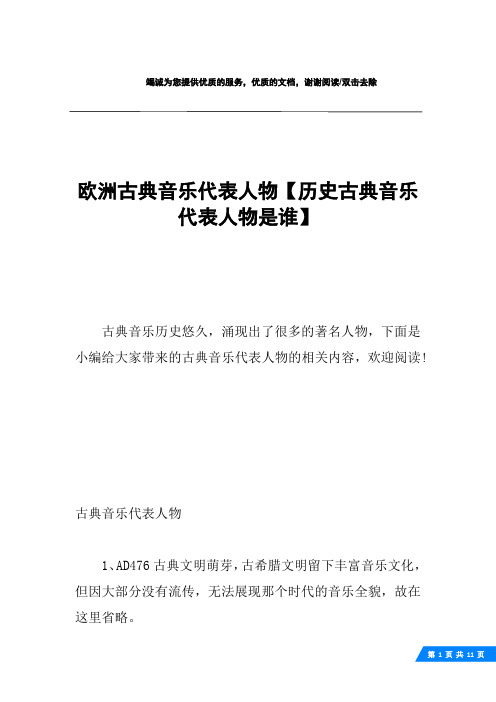
竭诚为您提供优质的服务,优质的文档,谢谢阅读/双击去除欧洲古典音乐代表人物【历史古典音乐代表人物是谁】古典音乐历史悠久,涌现出了很多的著名人物,下面是小编给大家带来的古典音乐代表人物的相关内容,欢迎阅读!古典音乐代表人物1、AD476古典文明萌芽,古希腊文明留下丰富音乐文化,但因大部分没有流传,无法展现那个时代的音乐全貌,故在这里省略。
2、AD476-1400欧洲中世纪,声乐雏形形成,作曲家有宾根的希尔德加德、马肖。
(可不了解)3、1400-1600文艺复兴时期,最简单的成熟声乐形式形成,但和声仍处于雏形。
作曲家:迪费、班舒瓦、奥克冈、若斯坎、帕莱斯特里纳、拉絮斯、蒙特威尔第(巴洛克音乐的先驱)等。
4、1600-1750巴洛克时期,以巴赫的逝世终结,宗教复调音乐达到顶峰,对位复调技术成熟,巴赫作为巴洛克音乐的集大成者,总结了该时期的音乐发展,开创了除歌剧外的几乎所有严肃音乐体裁,提出键盘乐器的十二平均律,著有《赋格的艺术》、《音乐的奉献》。
另外,法国作曲家拉摩写了第一部和声理论著作《和声学》,标志着和声理论的成熟。
巴洛克时期(仅代表时期,不代表流派)作曲家:科莱里、帕赫贝尔、吕利、普塞尔、库普兰、维瓦尔第、泰勒曼、拉摩、巴赫、亨德尔、斯卡拉蒂、塔蒂尼等。
5、1750-1820古典主义时期,从复调音乐转入以主调音乐为主,曲风明朗、旋律澄澈,古典主义代表人物为维也纳古典乐派的海顿、莫扎特和贝多芬(贝多芬是古典音乐的集大成者,同时开浪漫主义先河),另外还有格鲁克(歌剧改革者)、博凯里尼等。
(另外的一些比起这三位相去甚远,如胡梅尔,可不了解)6、1820-1910浪漫主义时期。
作品重在抒发内心感情;也有大量民族音乐家涌现,其作品带有各民族特色,表达出热爱祖国、热爱民族的感情。
浪漫主义及民族乐派作曲家:帕格尼尼、韦伯、罗西尼、柏辽兹、格林卡、门德尔松、肖邦、舒曼、李斯特、瓦格纳、威尔第、弗兰克、布鲁克纳、斯美塔纳、约翰·施特劳斯(父子)、鲁宾斯坦、勃拉姆斯、鲍罗丁、圣桑、比才、布鲁赫、穆索尔斯基、柴可夫斯基、德沃夏克、格里格、里姆斯基-科萨科夫、艾尔加、普契尼、马勒、理查·施特劳斯、西贝柳斯、拉赫玛尼诺夫等。
古典音乐知识
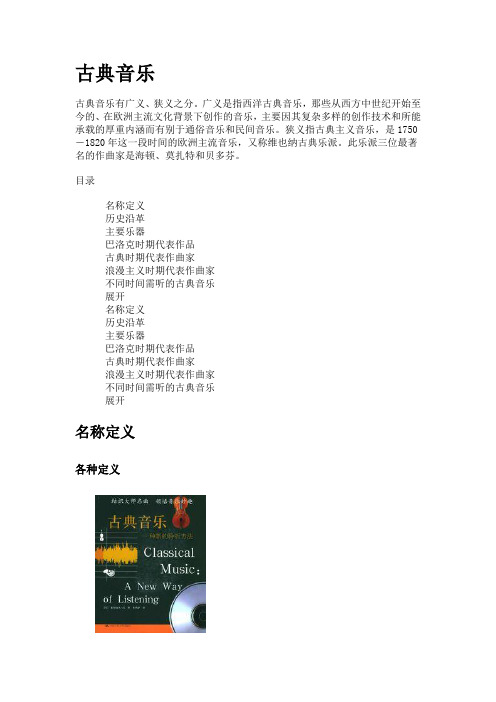
古典音乐古典音乐有广义、狭义之分。
广义是指西洋古典音乐,那些从西方中世纪开始至今的、在欧洲主流文化背景下创作的音乐,主要因其复杂多样的创作技术和所能承载的厚重内涵而有别于通俗音乐和民间音乐。
狭义指古典主义音乐,是1750-1820年这一段时间的欧洲主流音乐,又称维也纳古典乐派。
此乐派三位最著名的作曲家是海顿、莫扎特和贝多芬。
目录名称定义历史沿革主要乐器巴洛克时期代表作品古典时期代表作曲家浪漫主义时期代表作曲家不同时间需听的古典音乐展开名称定义历史沿革主要乐器巴洛克时期代表作品古典时期代表作曲家浪漫主义时期代表作曲家不同时间需听的古典音乐展开名称定义各种定义古典音乐丛书CLASSICAL MUSIC,中文翻译成“古典音乐”,有人认为“古典”给人的感觉有古董、古板的味道,故改称“经典音乐”。
也有人根据牛津英文辞典里对古典的定义,in traditional and serious style,而称其为“严肃音乐”。
于是,“古典音乐”又被戴上了“严肃”的帽子,让人更不敢靠近。
但下此定义的人一定没有好好查字典,因为serious的第二条义项是这样给出定义的:(指书、音乐等)启发思考的,不仅为消遣的。
因此我们知道原来古典音乐不同于流行音乐的地方是它内涵深刻,能发人深思,更能使人高尚,免于低俗。
再来看一下朗文辞典对古典音乐的解释:music that people consider serious and that has been popular for a long time。
可见,古典音乐是历经岁月考验,久盛不衰,为众人喜爱的音乐。
古典音乐是一个独立的流派,艺术手法讲求洗练,追求理性地表达情感。
古典音乐是一个含义广泛的术语,广义的西洋古典音乐是指那些从西方中世纪开始至今、并在欧洲主流文化背景下创作的音乐,或者指植根于西方传统礼拜式音乐和世俗音乐,其范围涵盖了约公元9世纪至今的全部时期。
主要因其复杂多样的创作技术和所能承载的厚重内涵而有别于通俗音乐和民间音乐。
海顿英文简介
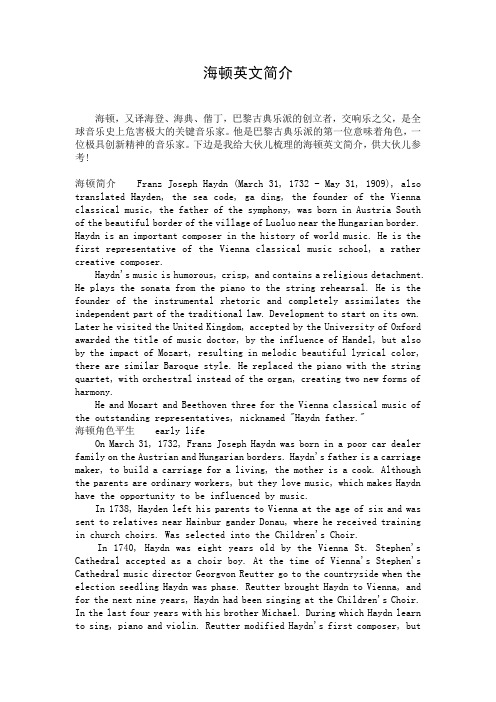
海顿英文简介海顿,又译海登、海典、偕丁,巴黎古典乐派的创立者,交响乐之父,是全球音乐史上危害极大的关键音乐家。
他是巴黎古典乐派的第一位意味着角色,一位极具创新精神的音乐家。
下边是我给大伙儿梳理的海顿英文简介,供大伙儿参考!海顿简介Franz Joseph Haydn (March 31, 1732 - May 31, 1909), also translated Hayden, the sea code, ga ding, the founder of the Vienna classical music, the father of the symphony, was born in Austria South of the beautiful border of the village of Luoluo near the Hungarian border. Haydn is an important composer in the history of world music. He is the first representative of the Vienna classical music school, a rather creative composer.Haydn's music is humorous, crisp, and contains a religious detachment. He plays the sonata from the piano to the string rehearsal. He is the founder of the instrumental rhetoric and completely assimilates the independent part of the traditional law. Development to start on its own. Later he visited the United Kingdom, accepted by the University of Oxford awarded the title of music doctor, by the influence of Handel, but also by the impact of Mozart, resulting in melodic beautiful lyrical color, there are similar Baroque style. He replaced the piano with the string quartet, with orchestral instead of the organ, creating two new forms of harmony.He and Mozart and Beethoven three for the Vienna classical music of the outstanding representatives, nicknamed "Haydn father."海顿角色平生early lifeOn March 31, 1732, Franz Joseph Haydn was born in a poor car dealer family on the Austrian and Hungarian borders. Haydn's father is a carriage maker, to build a carriage for a living, the mother is a cook. Although the parents are ordinary workers, but they love music, which makes Haydn have the opportunity to be influenced by music.In 1738, Hayden left his parents to Vienna at the age of six and was sent to relatives near Hainbur gander Donau, where he received training in church choirs. Was selected into the Children's Choir.In 1740, Haydn was eight years old by the Vienna St. Stephen's Cathedral accepted as a choir boy. At the time of Vienna's Stephen's Cathedral music director Georgvon Reutter go to the countryside when the election seedling Haydn was phase. Reutter brought Haydn to Vienna, and for the next nine years, Haydn had been singing at the Children's Choir. In the last four years with his brother Michael. During which Haydn learn to sing, piano and violin. Reutter modified Haydn's first composer, butdid not make a lesson for his regular professor. Despite this, Haydn has learned a lot - mainly through self-study, and he is very young to begin to enjoy the influence of the Vienna music environment, which is a musician is essential.In 1748, from the age of 16 his sweet song began to unfortunately gradually hoarse.1749, Haydn body has matured, has been unable to sing children's choir requirements of children's voice, coupled with some of the final change is out of the choir. It was said that he had spent the night on the park bench, but was then sheltered by his friends and began his career as a free musician. After ten years of hard years, Haydn did a lot of different work, as the Italian composer Niccola Antonio Porpora's followers. He tried to learn to fill their own professional deficiencies. And wrote his first quartet and the first opera. During this period, Haydn's professional attainments gradually increased, wings gradually feng.In 1754, Haydn began as Vienna was born 10-year-old Marianna Martines piano teacher. When he began to teach her, Marianna Martines had already played well. Haydn lives in a student's home and does not charge tuition to meet the room rate.In 1757, Haydn got his first important post, that is served as the chief of the Duke of Karlvon Morzin in the port of Lukavec of Pilsen.In 1759, at the age of 27 completed the first symphony. He became the music guide of the choir of the small church of Bohemia's Countess Moxin. As a long man he commanded a small band and wrote his first symphony, string trio, Cassationen, string quartet. These are mostly handwritten and not printed.The Duke of Morzin soon had financial difficulties and had to dissolve the band. But soon Haydn in 1761 in the Esterházy family to find a similar post of deputy director. Esterházy family at the time of the Austro-Hungarian Empire prominent position. Later, the band's long-time veteran Gregor Werner died in 1766, Haydn was promoted.Music servantIn 1761, Haydn was appointed as the deputy director of the palace by the prince of the most powerful of Paul Antonio Estherhazi in Hungary, where he spent a 30-year-old music service. The taste of being employed is bitter: you must wear embroidered vest, white long pantyhose, wig or comb, and have a pink powder on your face. Every day before and after lunch, to wait in the living room, waiting for the owner of the day of the arrangements for music activities instructions. In the creation, must be in the specified date by the owner of the proposition or request, written on time music works. In addition, it is necessary to supervise the discipline of the band, take care of every instrument, give the new singer class, improve the band level and so on. Haydn wrote sadly: "I am sitting in my wilderness, almost no human with me, I am very painful ... ... inrecent days I do not know if I am a long or theater ticket ... ... to know that often slaves are very sad ... ... ".Although sometimes the court life imposed on him all the constraints to provoke him angry, he still lived in such a world. The world does not doubt that the prince of the supreme, nor the suspicion of the great artist who wears uniforms. With regard to his status at Esther Haji's home, his own final evaluation argues that favorable conditions outweigh the unfavorable conditions. "Prince is always satisfied with my work.I am not only often encouraged, and as a band conductor, I can experiment, observe what produced the effect, what weakened the effect, I can improve, replace, add some additions and deletions, Can be boldly done as I like, I am isolated, no one to disturb or torture me, I was forced to become 'original talent'.As long as longAbout 1770 as a uniformed and commander of the palace of music, Haydn followed the family lived in three places: about 50 km from Vienna Eisenstadt Viennese Hermitage, and a new castle called Eszterháza. The castle was built in 1760 in the Hungarian border. Haydn's duties were mainly composer, leading the choir, playing chamber music for the members of the court, and organizing opera creation. Despite the many duties in the body, Haydn feels v ery full and happy. Esterházy's princes (first Paul II - PaulAnton, then Nikolai I -NikolausI.) Are very understanding of music, enjoy the work of Haydn and give him the necessary conditions to make his talent to play. They go to the chorus every day.In 1780, after having a stable long job, Haydn married Maria Anna Keller, but she was not feeling well after marriage. Maria Anna is not fertile, which makes Haydn very disappointed. There are rumors that he and the same is the Esterházy Orchestra actor Luig ia Polzelli dyed, and her son Anton's father. Haydn in Esterházy thirty years as Le long period, not only to create a large number of musical works, style has also been innovative, and fame out. Gradually began not only for employers, but also for the public to write.In 1781, Haydn and Mozart became good friends, and since then on his later works have a deep impact. They often like to play string quartets together. As we all know, Haydn at that time has stopped writing opera and symphony, and this is Mozart's strengths. Mozart specially wrote the first quartet to tie in with Haydn just finished the Op.33 series. Mozart dedicated the work to Haydn.On February 11, 1785, Haydn joined the Masonic Zurwahren Eintracht. Mozart was unable to attend his inauguration ceremony because he had to attend the concert of his father Leopold Mozart that day. Mozart is also a member of the organization. It is this relationship that deepens the deep friendship between Haydn and Mozart.Independent musiciansIn 1790, Nikolaus Dagong died, his heir did not have the slightest musical taste, so the dissolution of the court band and let Haydn retired. Haydn then accepted the invitation of German music manager Johann Peter Salomon to London to join his newly formed symphony orchestra and choir. The two trips (1791 - 1792 and 1794 - 1795, respectively) were a great success. The audience came to watch Haydn's show, so that Haydn fame and fortune. During London, Haydn also completed a number of important works, such as Symphony Orchestra, Army, London, Knight Quartet and Gypsy Trio.In 1791, Haydn went to London, a year to write a opera, symphony 6 and 20 other works, his music is very popular. He attended the Westminster's Handel Music Festival and became an honorary musician at Oxford University. Haydn had considered joining the British and lived there for a long time, but failed to do so. He returned to Vienna, built a new house, and changed his style of writing, began to write the magnificent chorus and symphony works. He completed the creation of the oratorio "Genesis" and "Four Seasons" and wrote six church works for the Esterházy family. Esterházy family then the prince liked the music. Haydn also completed the last nine of his string quartet series, such as the Emperor Quartet, the Pentagon Quartet and the Sunrise. Although Haydn is not young, he is still full of longing for the future. In a letter he wrote: "There is so much to do in this wonderful art!"In 1802, Haydn felt that a disease that had plagued him for years had worsened so much that he could not continue to compose music. This is undoubtedly a hit for Haydn: as he himself said, there are so many fresh music ideas, such as the influx of water, waiting for him to complete. Although Haydn was carefully watched by his servant in the last few years, it was often visited and received many honors, but it was not his happiest time. In the illness, he often played by the Austrian King Chung to find spiritual comfort. This song is his 1797 years with a patriot's passionate creation.Behind the thingsMay 31, 1809, Haydn died in Napoleon after the death of Vienna. At the age of 77 years old. His last words, was actually in the neighborhood was bombarded after his comfort to the servants do not be afraid. Haydn was buried in the Hundsturmer cemetery (Haydn Park, Vienna Meidling).And Esterhazy family even turned a blind eye to this. Until later the Duke of vonCambridge and NikolausII Dagong said that the talented Hayd had done in his home for many years, he decided in 1820 to Haydn's tomb to Eisenstadt's Haydn Church. When Haydn's coffin was opened, people found the head was gone. Later the survey found that Esterhazy Dagong's secretary - Joshua Carl Rosenbaum, was the admirer of the skull scholar Franz JososGall. He bought the prison administrator and the other two civil servants, buried in Haydn for eight days, the coffin opened, stole the skull. Because at that time can not find the stolen skull, people canonly the head of the body transported to Eisenstadt buried. Later the prison manager JohannPeter gave the police a so-called Haydn skull, but the real skull was in the secretary Rosenbaum there. He let the friend Peter transfer the skull to the music academy. But until Peter did not finish the task. Peter's widow still did not do it. The skull was later held by many people until 1895 by the Friends of the Vienna Musicians Association Collection in its museum until 1953. And after several twists and turns, and finally in 1954 skull from Vienna was transported to Eisenstadt and body together. After 145 years, Haydn finally had the whole corpse.海顿人物评价Haydn's music is humorous, laid-back, bright, light, with a religious detachment, he will be sonata from the piano to the development of the string to the ensemble, he is the founder of the instrumentalist, the traditional method of independence , The theme of development to start their own. Later he visited the United Kingdom, accepted by the University of Oxford awarded the title of the music doctor, by the influence of Handel, resulting in melodic beautiful lyrical color, there is a similar Baroque style. He replaced the piano with the string quartet, with orchestral instead of the organ, creating two new forms of harmony.Haydn was known as the "father of the symphony", with Mozart and Beethoven three for the Austrian classical music school outstanding representative, nicknamed "Haydn Daddy." Haydn 29-year-old palace long, from the binding "father" love, until the 77-year-old driving west tour. Haydn strong popularity, get the crowd called him "father". Interestingly, even the British presented his parrot, but met the owner, but also a Papa. In fact, regardless of symphony or string quartet is not his first, but the two respects but also reputation, because it is in his cultivation, these two important instrumental music genius from the grass into the mature stage.German composer Wagner (1813-1883) commented on Haydn's preaching that he pursued a calm and comfortable life and sought to maintain his beloved status, so he was seen as a man of obedience The Haydn is not like Mozart, dare to fight with the feudal forces, more than Beethoven, heroic initiative to the dark reality to start onslaught! Haydn is Haydn, although he sometimes humiliating the situation of pain, but can be satisfied with the status quo, Its music. His music style as his personality: optimistic, kind, sincere, hearty, humorous.In the string quartet, he uses the "principle of speech", that is, the various parts of the conversation like a conversation echoes, both clear melody, there are polyphonic beauty. "From Haydn I first learned the real way of writing a quartet." In the symphony he "established the principle of sonata development with a small motive, and abolished the tradition of digital bass , And began to establish the principles of thepreparation and matching of modern orchestra. " These are given Mozart and Beethoven great inspiration.。
古典音乐作曲家列表

古典音乐作曲家列表这是古典音乐作曲家列表的索引,按作曲家英文姓氏的首字母排序。
A卡尔·弗里德里希·阿贝尔(Abel, Carl Friedrich)让·阿布西尔(Absil, Jean)阿道夫·亚当(Adam, Adolphe)约翰·亚当斯(Adams, John)耶罕·阿兰(Alain, Jehan)伊萨克·阿尔贝尼兹(Albéniz, Isaac)欧根·达尔伯特(d'Albert, Eugen)托马索·阿尔比诺尼(Albinoni, Tomaso)约翰·格奥尔格·阿尔布雷希茨贝格(Albrechtsberger, Johann Georg)雨果·阿尔芬(Alfvén, Hugo)夏尔-瓦朗坦·阿尔康(Alkan, Charles-Valentin)安东·阿连斯基(Arensky, Anton)马尔科姆·阿诺德(Arnold, Malcolm)胡安·克里索斯托莫·阿里亚加(Arriaga, Juan Crisóstomo)亚历山大·阿鲁秋年(Arutiunian, Alexander)鲍里斯·阿萨菲耶夫(Asafyev, Boris)库特·阿特伯格(Atterberg, Kurt)丹尼尔·奥柏(Auber, Daniel)乔治·奥里克(Auric, Georges)查尔斯·阿维森(Avison, Charles)B米尔顿·巴比特(Babbitt, Milton)格拉奇娜·巴切维茨(Bacewicz, Grażyna)卡尔·菲利普·埃曼努埃尔·巴赫(Bach, Carl Philipp Emanuel)约翰·克里斯蒂安·巴赫(Bach, Johann Christian)约翰·克里斯托弗·弗里德里希·巴赫(Bach, Johann Christoph Friedrich)约翰·塞巴斯蒂安·巴赫(Bach, Johann Sebastian)威廉·弗里德曼·巴赫(Bach, Wilhelm Friedemann)阿加特·巴克-格伦达尔(Backer-Grøndahl, Agathe)米利·巴拉基列夫(Balakirev, Mily)迈克尔·威廉·巴尔夫(Balfe, Michael William)格兰维尔·班托克(Bantock, Granville)塞缪尔·巴伯(Barber, Samuel)沃尔德马尔·巴吉尔(Bargiel, Woldemar)奥古斯丁·巴里奥斯(Barrios, Agustín)巴托克·贝拉(Bartók, Béla)阿诺德·巴克斯(Bax, Arnold)艾米·比奇(Beach, Amy)路德维希·范·贝多芬(Beethoven, Ludwig Van)温琴佐·贝利尼(Bellini, Vincenzo)弗朗兹·本达(Benda, Franz)格奥尔格·安东·本达(Benda, Georg Anton)阿瑟·本杰明(Benjamin, Arthur)彼得·伯努瓦(Benoit, Peter)阿尔班·贝尔格(Berg, Alban)卢西亚诺·贝里奥(Berio, Luciano)夏尔·德·贝里奥(Beriot, Charles de)埃克托·柏辽兹(Berlioz, Hector)伦纳德·伯恩斯坦(Bernstein, Leonard)弗朗兹·贝瓦尔德(Berwald, Franz)费迪南德·拜厄(Beyer, Ferdinand)海因里希·比贝尔(Biber, Heinrich Ignaz)吉尔·班舒瓦(Binchois, Gilles)乔治·比才(Bizet, Georges)阿瑟·布利斯(Bliss, Arthur)欧内斯特·布洛赫(Bloch, Ernest)路易吉·博凯里尼(Boccherini, Luigi)莱昂·波尔曼(Boèllmann, Léon)弗朗索瓦-阿德里安·布瓦尔迪厄(Boieldieu, François-Adrien)阿里格·博伊托(Boito, Arrigo)若奥·多明戈·彭坦波(Bomtempo, João Domingos)安东尼奥·马利亚·博农奇尼(Bononcini, Antonio Maria)亚历山大·鲍罗丁(Borodin, Alexander)谢尔盖·波特凯维茨(Bortkiewicz, Sergei)德米特里·博尔特尼扬斯基(Bortniansky, Dmitry)乔瓦尼·博泰西尼(Bottesini, Giovanni)约克·鲍文(Bowen, York)威廉·博伊斯(Boyce, William)莉莉·布朗热(Boulanger, Nadia)娜迪亚·布朗热(Boulanger, Nadia)皮埃尔·布列兹(Boulez, Pierre)约翰内斯·勃拉姆斯(Brahms, Johannes)弗兰克·布里奇(Bridge, Franck)本杰明·布里顿(Britten, Benjamin)弗朗蒂舍克·布里克西(Brixi, František)莱奥·布劳威尔(Brouwer, Leo)马克斯·布鲁赫(Bruch, Max)安东·布鲁克纳(Bruckner, Anton)弗里德里希·布尔格缪勒(Burgmüller, Friedrich)诺伯特·布尔格缪勒(Burgmüller, Norbert)费卢西奥·布索尼(Busoni, Ferruccio)迪特里希·布克斯特胡德(Buxtehude, Dietrich)威廉·伯德(Byrd, William)C约翰·凯奇(Cage, John)安德烈·坎普拉(Campra, André)约瑟夫·康特卢布(Canteloube, Joseph)安德烈·卡普莱(Caplet, André)查尔斯·卡米莱里(Carmilleri, Charles)埃德温·卡尔(Carr, Edwin)艾略特·卡特(Carter, Elliott)帕布罗·卡萨尔斯(Casals, Pablo)阿尔弗雷多·卡塞拉(Casella, Alfredo)马里奥·卡斯泰尔诺沃-泰代斯科(Castelnuovo-Tedesco, Mario)乔治·卡托瓦(Catoire, Georgy)亚历杭德罗·加西亚·卡图尔拉(Caturla, Alejandro García)埃马纽埃尔·夏布里埃(Chabrier, Alexis-Emmanuel)乔治·查德威克(Chadwick, George)塞西莉·夏米娜德(Chaminade, Cécile)古斯塔夫·夏庞蒂埃(Charpentier, Gustave)欧内斯特·肖松(Chausson, Ernest)卡洛斯·查维斯(Chávez, Carlos)陈其钢(Chen, Qigang)陈怡(Chen, Yi)路易吉·凯鲁比尼(Cherubini, Luigi)弗雷德里克·肖邦(Chopin, Frédéric)周文中(Chou, Wen-chung)多米尼科·奇马罗萨(Cimarosa, Domenico)穆齐奥·克莱门蒂(Clementi, Muzio)帕斯科·科拉斯(Collasse, Pascal)阿隆·科普兰(Copland, Aaron)阿尔坎杰罗·科雷利(Corelli, Arcangelo)约翰·科里利亚诺(Corigliano, John)彼得·科内利乌斯(Cornelius, Peter)弗朗索瓦·库普兰(Couperin, Francois)亨利·考埃尔(Cowell, Henry)让·克哈斯(Cras, Jean)威廉·克罗夫特(Croft, William)伯恩哈德·亨里克·克鲁赛尔(Crusell, Bernhard Henrik)塞萨尔·居伊(Cui, César)卡尔·车尔尼(Czerny, Carl)D路易吉·达拉皮科拉(Dallapiccola, Luigi)弗朗兹·但齐(Danzi, Franz)亚历山大·达尔戈梅日斯基(Dargomyzhsky, Alexander)卡尔·达维多夫(Davidov, Karl)克劳德·德彪西(Debussy, Claude)米歇尔·理查德·德拉兰德(Delalande, Michael Richard)利奥·德里布(Délibes, Léo)弗雷德里克·戴留斯(Delius, Frederick)爱迪生·杰尼索夫(Denisov, Edison)安德烈·卡迪纳·德图什(Destouches, André Cardinal)安东·迪亚贝利(Diabelli, Anton)阿尔丰斯·迪彭布罗克(Diepenbrock, Alphons)卡尔·冯·迪特斯多夫(Dittersdorf, Carl von)多赫南伊·埃尔诺(Dohnanyi, Ernő)葛塔诺·多尼采蒂(Donizetti, Gaetano)约翰·道兰德(Dowland, John)费利克斯·德莱塞克(Draeseke, Felix)皮埃尔·马克斯·杜布瓦(Dubois, Pierre Max)提奥多·杜布瓦(Dubois, Théodore)纪尧姆·迪费(Dufay, Guillaume)保罗·杜卡斯(Dukas, Paul)马塞尔·迪普雷(Dupré, Marcel)路易·迪雷(Durey, Louis)弗朗蒂舍克·克萨韦尔·杜舍克(Dušek, František Xaver)扬·拉迪斯拉夫·杜舍克(Dussek, Jan Ladislav)巴里斯·德瓦利奥纳斯(Dvarionas, Balys)安东宁·德沃夏克(Dvorák, Antonín)亨利·迪帕克(Duparc, Henri)莫里斯·迪吕弗莱(Duruflé, Maurice)E汉斯·艾斯勒(Eisler, Hanns)爱德华·埃尔加(Elgar, Edward)莫里斯·埃马努埃尔(Emmanuel, Maurice)乔治·埃内斯库(Enescu, George)艾凯尔·费伦茨(Erkel, Ferenc)海因里希·威尔海姆·恩斯特(Ernst, Heinrich Wilheim)F曼努埃尔·德·法利亚(Falla, Manuel de)加布里埃尔·福莱(Fauré, Gabriel)兹德涅克·菲比赫(Fibich, Zdeněk)约翰·菲尔德(Field, John)弗里德里希·冯·弗洛托(Flotow, Friedrich von)约瑟夫·博胡斯拉夫·费尔斯特(Foerster, Josef Bohuslav)阿瑟·富特(Foote, Arthur)约翰·福尔兹(Foulds, John)塞扎尔·弗兰克(Franck, César)腓特烈二世(Friedrich II)威廉·亨利·弗赖(Fry, William Henry)罗伯特·富克斯(Fuchs, Robert)威尔海姆·富特文格勒(Furtwängler, Wilhelm)约翰·约瑟夫·富克斯(Fux, Johann Joseph)G安德烈·加布里埃利(Gabrieli, Andrea)乔万尼·加布里埃利(Gabrieli, Giovanni)尼尔斯·加德(Gade, Niels)罗伯托·格哈德(Gerhard, Robert)卡洛·杰苏阿尔多(Gesualdo, Carlo)乔治·格什温(Gershwin, George)阿尔伯托·希纳斯特拉(Ginastera, Alberto)翁贝托·焦尔达诺(Giordano, Umberto)菲利普·格拉斯(Glass, Philip)路易斯·格拉斯(Glass, Louis)亚历山大·格拉祖诺夫(Glazunov, Alexander)莱因霍尔德·格里埃尔(Gliére, Reinhold)米哈依尔·伊万诺维奇·格林卡(Glinka, Mikhail)克里斯托夫·维利巴尔德·格鲁克(Gluck, Christoph Willibald)本杰明·戈达(Godard, Benjamin)利奥波德·戈多夫斯基(Godowsky, Leopold)赫尔曼·格茨(Goetz, Hermann)卡尔·戈德马克(Goldmark, Karl)亨里克·戈雷斯基(Górecki, Henryk)弗朗索瓦-约瑟夫·戈塞克(Gossec, François-Joseph)雅科夫·戈托瓦茨(Gotovac, Jakov)路易斯·莫罗·戈特沙尔克(Gottschalk, Louis Moreau)夏尔·古诺(Gounod, Charles)珀西·格兰杰(Grainger, Percy)恩里克·格拉纳多斯(Granados, Enrique)卡尔·海因里希·格劳恩(Graun, Karl Heinrich)亚历山大·格列恰尼诺夫(Grechaninov, Alexander)阿图尔·德·格里夫(Greef, Arthur de)爱德华·格里格(Grieg, Edvard)查尔斯·格里费斯(Griffes, Charles)莫扎特·卡马戈·瓜尼埃里(Guarnieri, Mozart Camargo)卡洛斯·瓜斯塔维诺(Guastavino, Carlos)索菲娅·古拜杜丽娜(Gubaidulina, Sofia)亚历山大·吉尔芒(Guilmant, Alexandre)郭文景(Guo, Wenjing)阿达尔伯特·吉罗维茨(Gyrowetz, Adalbert)H帕维尔·哈斯(Haas, Pavel)阿洛伊斯·哈巴(Hába, Alois)雷纳尔多·哈恩(Hahn, Reynaldo)雅克·弗洛蒙塔尔·阿莱维(Halévy, Jacques Fromental)约翰·哈尔沃森(Halvorsen, Johan)阿斯格尔·哈梅里克(Hamerik, Asger)格奥尔格·弗里德里希·亨德尔(Handel, George Frideric)夏尔-路易·哈农(Hanon, Charles-Louis)霍华德·汉森(Hanson, Howard)约翰·哈比森(Harbison, John)罗伊·哈里斯(Harris, Roy)约翰·彼得·埃米琉斯·哈特曼(Hartmann, Johan Peter Emilius)卡尔·阿玛德乌斯·哈特曼(Hartmann, Karl Amadeus)汉密尔顿·哈蒂(Harty, Hamilton)约翰·阿道夫·哈塞(Hasse, Johann Adolph)约瑟夫·马蒂亚斯·豪尔(Hauer, Josef Matthias)约瑟夫·海顿(Haydn, Joseph)米歇尔·海顿(Haydn, Michael)贺绿汀(He, Lüting)斯蒂芬·海勒(Heller, Stephen)阿道夫·冯·亨泽尔特(Henselt, Adolf von)汉斯·维尔纳·亨策(Henze, Hans Werner)威廉·赫歇尔(Herschel, William)费迪南·埃罗尔德(Hérold, Ferdinand)海因里希·冯·赫尔佐根伯格(Herzogenberg, Heinrich von)宾根的希尔德加德(Hildegard von Bingen)阿尔弗雷德·希尔(Hill, Alfred)费迪南·希勒(Hiller, Ferdinand)保罗·欣德米特(Hindemith,Paul)沃恩·霍尔姆波(Holmboe, Vagn)古斯塔夫·霍尔斯特(Holst, Gustav)阿图尔·奥乃格(Honegger, Arthur)阿兰·霍夫哈奈斯(Hovhaness, Alan)萧泰然(Hsiao, Tyzen)黄自(Huang, Zi)汉斯·胡伯(Huber, Hans)约翰·尼波默克·胡梅尔(Hummel, Johann Nepomuk)恩格尔贝特·洪佩尔丁克(Humperdinck, Engelbert)I雅克·伊贝尔(Ibert, Jacques)伊福部昭(Ifukube, Akira)樊尚·丹第(D'Indy, Vincent)约翰·艾尔兰(Ireland, John)查尔斯·艾夫斯(Ives, Charles)米哈伊尔·伊波里托夫-伊凡诺夫(Ippolitov-Ivanov, Mikhail)J萨洛蒙·雅达松(Jadassohn, Salomon)莱奥什·雅纳切克(Janáček, Leoš)克莱门特·雅内坎(Janequin, Clément)江文也(Jiang, Wenye)约瑟夫·约阿希姆(Joachim, Joseph)安德烈·若利韦(Jolivet, André)约瑟夫·戎冈(Jongen, Joseph)若斯坎·德普雷(Josquin des Prez)K德米特里·卡巴列夫斯基(Kabalevsky, Dmitri)罗伯特·卡亚努斯(Kajanus, Robert)瓦西里·卡林尼科夫(Kalinnikov, Vasily)扬·卡利沃达(Kalivoda, Jan)弗里德里希·卡尔克布雷纳(Kalkbrenner, Friedrich)马诺利斯·卡洛米里斯(Kalomiris, Manolis)齐格弗里德·卡格-埃勒特(Karg-Elert, Sigfrid)米奇斯拉夫·卡洛维茨(Karłowicz, Mieczysław)阿尔伯特·凯特尔比(Ketèlbey, Albert William)阿拉姆·哈恰图良(Khachaturian, Aram)吉洪·赫连尼科夫(Khrennikov, Tikhon)沃伊切赫·基拉尔(Kilar, Wojciech)乌诺·克拉米(Klami, Uuno)朱利叶斯·克伦格尔(Klengel, Julius)柯达伊·佐尔坦(Kodály, Zoltán)夏尔·凯什兰(Koechlin, Charles)埃里希·科恩戈尔德(Korngold, Erich Wolfgang)列奥波德·科策卢(Kozeluch, Leopold)约瑟夫·马丁·克劳斯(Kraus, Joseph Martin)弗里茨·克莱斯勒(Kreisler, Fritz)恩斯特·克热内克(Krenek, Ernst)弗朗兹·克罗默尔(Krommer, Franz)弗里德里希·库劳(Kuhlau, Friedrich)库塔格·捷尔吉(Kurtág, György)L爱德华·拉罗(Lalo, Edouard)乌埃德·兰戛尔(Langgaard, Rued)约瑟夫·兰纳(Lanner, Joseph)奥兰多·德·拉絮斯,又名拉索(Lassus, Orlando di(Lasso))让-玛丽·勒克莱尔(Leclair, Jean-Marie)埃内斯托·莱库纳(Lecuona, Ernesto)弗朗兹·莱哈尔(Lehár, Franz)琼·莱夫斯(Leifs, Jón)纪尧姆·勒克(Lekeu, Guillaume)鲁杰罗·莱翁卡瓦洛(Leoncavallo, Ruggiero)提奥多·莱谢蒂茨基(Leschetizky, Theodor)李焕之(Li, Huanzhi)利盖蒂·捷尔吉(Ligeti, Gyorgy)道格拉斯·利尔本(Lilburn, Douglas)弗朗兹·李斯特(Liszt, Franz)马修·洛克(Locke, Matthew)卡尔·勒韦(Loewe, Carl)阿尔伯特·洛尔青(Lortzing, Albert)路易·斐迪南亲王(Prince Louis Ferdinand of Prussia)让-巴普蒂斯特·吕利(Lully, Jean-Baptiste)维托尔德·卢托斯瓦夫斯基(Lutoslawski, Witold)阿纳托利·里亚多夫(Lyadov, Anatoly)谢尔盖·利亚普诺夫(Lyapunov, Sergei)鲍里斯·利亚托申斯基(Lyatoshynsky, Borys)M马思聪(Ma, Sicong)爱德华·麦克道威尔(Macdowell, Edward)纪尧姆·德·马肖(Machaut, Guillaume de)里维·马代托亚(Madetoja, Leevi)阿尔伯里克·马尼亚尔(Magnard, Albéric)古斯塔夫·马勒(Mahler, Gustav)吉安·弗朗西斯科·马利皮耶罗(Malipiero, Gian Francesco)伊戈尔·马克维奇(Markevitch, Igor)安托万·弗朗索瓦·马蒙泰尔(Marm ontel, Antoine François)海因里希·马施纳(Marschner, Heinrich)乔凡尼·巴蒂斯塔·马蒂尼(Martini, Giovanni Battista)弗兰克·马丁(Martin, Frank)比森特·马丁-索勒(Martín y Soler, Vicente)博胡斯拉夫·马尔蒂努(Martinů, Bohuslav)朱塞佩·马尔图齐(Martucci, Giuseppi)约瑟夫·马克思(Marx, Joseph)皮埃特罗·马斯卡尼(Mascagni, Pietro)儒勒·马斯内(Massenet, Jules)彼得·马克斯韦尔·戴维斯(Maxwell Davies, Peter)尼古拉·梅特纳(Medtner, Nicolai)约翰·德·梅杰(Meij, Johan de)埃尔基·梅拉尔丁(Melartin, Erkki)范妮·门德尔松(Mendelssohn, Fanny)费利克斯·门德尔松(Mendelssohn, Felix)吉安·卡洛·梅诺蒂(Menotti, Gian Carlo)阿尔·梅利康托(Merikanto, Aarre)奥斯卡·梅利康托(Merikanto, Oskar)安德烈·梅萨热(Messager, André)奥立佛·梅西安(Messiaen, Olivier)贾科莫·梅耶贝尔(Meyerbeer, Giacomo)弗朗西斯科·米戈农(Mignone, Francisco)达律斯·米约(Milhaud, Darius)路德维希·明库斯(Minkus, Ludwig)费德里科·蒙波(Mompou, Federico)让-约瑟夫·卡桑尼·德·蒙东维尔(Mondonville, Jean-Joseph Cassanea de)斯坦尼斯拉夫·莫纽什科(Moniuszko, Stanislaw)克劳迪奥·蒙特威尔第(Monteverdi, Claudio)伊格纳兹·莫谢莱斯(Moscheles, Ignaz)亚历山大·莫索洛夫(Mosolov, Alexander)莫里茨·莫什科夫斯基(Moszkowski, Moritz)利奥波德·莫扎特(Leopold, Mozart)沃尔夫冈·阿玛迪乌斯·莫扎特(Mozart, Wolfgang Amadeus)弗朗兹·克萨韦尔·沃尔夫冈·莫扎特(Mozart, Franz Xaver Wolfgang)莫杰斯特·彼得罗维奇·穆索尔斯基(Mussorgsky, Modest)尼古拉·米亚斯科夫斯基(Myaskovsky, Nicolai)约瑟夫·米斯利维切克(Mysliveček, Josef)N奥托·尼古拉(Nicolai, Otto)卡尔·尼尔森(Nielsen, Carl)路易吉·诺诺(Nono, Luigi)齐格蒙特·诺斯科夫斯基(Noskowski, Zygmunt)维捷斯拉夫·诺瓦克(Novák, Vítězslav)珀尔·纳尔戈尔(Nørgård, Per)O雅各布·奥布雷赫特(Obrecht, Jacob)约翰内斯·奥克冈(Ockeghem, Johannes)雅克·奥芬巴赫(Offenbach, Jacques)乔治·翁斯洛(Onslow, George)卡尔·奥尔夫(Orff, Carl)P约翰·帕赫贝尔(Pachelbel, Johann)伊格纳奇·扬·帕德雷夫斯基(Paderewski, Ignacy Jan)约翰·诺尔斯·佩因(Paine, John Knowles)乔万尼·帕伊谢洛(Paisiello, Giovanni)塞利姆·帕姆格伦(Palmgren, Selim)安德热·帕努夫尼克(Panufnik, Andrzej)霍雷肖·帕克(Parker, Horatio)休伯特·帕里(Parry, Hubert)阿沃·帕特(Pärt, Arvo)尼可罗·帕格尼尼(Paganini, Niccolo)乔万尼·帕莱斯特里纳(Palestrina, Giovanni Pierluigi da)费利佩·佩德雷尔(Pedrell, Felip)克里斯托弗·潘德列茨基(Penderecki, Krzysztof)乔瓦尼·巴蒂斯塔·佩尔戈莱西(Pergolesi, Giovanni Battista)威尔海姆·彼得森-伯格(Peterson-Berger, Wilhelm)阿兰·佩特森(Pettersson, Allan)汉斯·普菲茨纳(Pfitzner, Hans)弗朗索瓦-安德烈·丹尼根·菲利多尔(Philidor, François-André Danican)加布里埃尔·皮尔纳(Pierné, Gabriel)威廉·皮佩尔(Pijper, Willem)瓦尔特·辟斯顿(Piston, Walter)伊尔代布兰多·皮泽蒂(Pizzetti, Ildebrando)伊格纳兹·普莱耶尔(Pleyel, Ignaz)曼努埃尔·庞塞(Ponce, Manuel)大卫·波佩尔(Popper, David)弗朗西斯·普朗克(Poulenc, Francis)谢尔盖·普罗科菲耶夫(Prokofiev, Sergey)贾科莫·普契尼(Puccini, Giacomo)亨利·珀塞尔(Purcell, Henry)Q瞿小松(Qu, Xiao-song)R谢尔盖·拉赫玛尼诺夫(Rachmaninoff, Sergei)约阿希姆·拉夫(Raff, Joachim)让-菲利普·拉莫(Rameau, Jean-Philippe)莫里斯·拉威尔(Ravel, Maurice)埃诺约哈尼·劳塔瓦拉(Rautavaara, Einojuhani)马克斯·雷格(Reger, Max)斯蒂夫·莱奇(Reich, Steve)安东·雷哈(Reicha, Anton)卡尔·赖内克(Reinecke, Carl)奥托里诺·雷斯庇基(Respighi, Ottorino)西尔维斯特里·雷维尔塔斯(Revueltas, Silvestre)艾米尔·冯·雷兹尼克(Reznicek, Emil von)约瑟夫·赖因贝格尔(Rheinberger, Joseph)弗朗兹·克萨韦尔·里赫特(Richter, Franz Xaver)费迪南德·里斯(Ries, Ferdinand)沃尔夫冈·里姆(Rihm, Wolfgang)特里·赖利(Riley, Terry)尼古拉·里姆斯基-科萨科夫(Rimsky-Korsakov, Nikolai)华金·罗德里戈(Rodrigo, Joaquin)阿马德奥·罗尔丹(Roldán, Amadeo)朱利叶斯·隆特根(Röntgen, Julius)居伊·罗帕茨(Ropartz, Guy)胡文蒂诺·罗萨斯(Rosas, Juventino)安东尼奥·罗塞蒂(Rosetti, Antonio)尼古拉·罗斯拉维茨(Roslavets, Nicolai)焦阿基诺·罗西尼(Rossini, Gioachino)尼诺·罗塔(Rota, Nino)汉斯·罗特(Rott, Hans)阿尔伯特·鲁塞尔(Roussel, Albert)罗饶·米克罗斯(Rózsa, Miklós)安东·鲁宾斯坦(Rubinstein, Anton)尼古拉·鲁宾斯坦(Rubinstein, Nikolai)卡尔·拉格尔斯(Ruggles, Carl)约翰·鲁特(Rutter, John)雅各布·扬·莱巴(Ryba, Jakub Jan)S哈拉尔·萨弗鲁德(Sæverud, Harald)卡米尔·圣桑(Saint-Saèns, Camille)安东尼奥·萨列里(Salieri, Antonio)奥利斯·萨利南(Sallinen, Aulis)乔万尼·巴蒂斯塔·萨马丁尼(Sammartini, Giovanni Battista)帕布罗·德·萨拉萨蒂(Sarasate, Pablo)埃里克·萨蒂(Satie, Erik)艾赫迈德·阿德南·赛贡(Saygun, Ahmed Adnan)亚历山德罗·斯卡拉蒂(Scarlatti, Alessandro)多梅尼科·斯卡拉蒂(Scarlatti, Domenico)克萨韦尔·沙尔文卡(Scharwenka, Xaver)萨缪尔·沙伊特(Scheidt, Samuel)马克斯·冯·席林斯(Schillings, Max von)约翰·海因里希·施梅尔策(Schmelzer, Johann Heinrich)弗朗兹·施密特(Schmidt, Franz)弗洛朗·施米特(Schmitt, Florent)阿尔弗雷德·施尼特凯(Schnittke, Alfred)奥特马·舍克(Schoeck, Othmar)阿诺德·勋伯格(Schoenberg, Arnold)弗朗兹·施雷克尔(Schreker, Franz)弗朗兹·舒伯特(Schubert, Franz)埃尔文·舒尔霍夫(Schulhoff, Erwin)克拉拉·舒曼(Schumann, Clara)罗伯特·舒曼(Schumann, Robert)威廉·舒曼(Schuman, William)海因里希·许茨(Schütz, Heinrich)亚历山大·斯克里亚宾(Scriabin, Alexander)朱利安·斯克里亚宾(Scriabin, Julian)彼得·斯克尔索普(Sculthorpe, Peter)卡洛斯·塞夏斯(Seixas, Carlos)罗杰·塞欣斯(Sessions, Roger)德奥达·德·塞弗拉克(Séverac, Déodat de)乔万尼·斯甘巴蒂(Sgambati, Giovanni)罗季翁·谢德林(Shchedrin, Rodion)维沙翁·舍巴林(Shebalin, Vissarion)德米特里·肖斯塔科维奇(Shostakovich, Dmitri)让·西贝柳斯(Sibelius, Jean)克里斯蒂安·辛丁(Sinding, Christian)尼科斯·斯卡尔科塔斯(Skalkottas, Nikolaos)贝多伊齐·斯美塔那(Smetana, Bedrich)安东尼奥·索勒(Soler, Antonio)费尔南多·索尔(Sor, Fernando)约翰·菲利普·苏萨(Sousa, John Philip)路易斯·施波尔(Spohr, Louis)安东·斯塔米茨(Stamitz, Anton)卡尔·斯塔米茨(Stamitz, Carl)约翰·斯塔米茨(Stamitz, Johann)查尔斯·维利尔斯·斯坦福(Stanford, Charles Villiers)威尔海姆·斯丹哈默(Stenhammar, Wilhelm)卡尔海因茨·施托克豪森(Stockhausen, Karlheinz)亚历山德罗·斯特拉代拉(Stradella, Alessandro)奥斯卡·施特劳斯(Straus, Oscar)爱德华·施特劳斯(Strauss, Eduard)老约翰·施特劳斯(Strauss, Johann I)小约翰·施特劳斯(Strauss, Johann II)约瑟夫·施特劳斯(Strauss, Josef)理查·施特劳斯(Strauss, Richard)伊戈尔·斯特拉文斯基(Stravinsky, Igor)约翰·斯文森(Svendsen, Johan)约瑟夫·苏克(Suk, Josef)阿瑟·萨利文(Sullivan, Arthur)弗兰兹·冯·苏佩(Suppè, Franz von)弗朗兹·克萨韦尔·苏斯迈尔(Süßmayr, Franz Xaver)扬·皮泰尔索恩·斯韦林克(Sweelinck, Jan Pieterzoon)卡罗尔·席曼诺夫斯基(Szymanowski, Karol)T热尔梅娜·塔耶芙尔(Tailleferre, Germaine)武满彻(Takemitsu, Tōru)托马斯·塔利斯(Tallis, Thomas)谭盾(Tan, Dun)亚历山大·汤斯曼(Tansman, Alexandre)谢尔盖·塔涅耶夫(Taneyev, Sergei)弗朗西斯科·塔雷加(Tárrega, Francisco )朱塞佩·塔蒂尼(Tartini, Giuseppe)约翰·塔文纳(Tavener, John)约翰·塔弗纳(Taverner, John)鲍里斯·柴可夫斯基(Tchaikovsky, Boris)彼得·伊里奇·柴可夫斯基(Tchaikovsky, Pyotr Ilyich)尼古拉·切列普宁(Tcherepnin, Nicolai)亚历山大·齐尔品(Tcherepnin, Alexander)格奥尔格·菲利普·泰勒曼(Telemann, Georg Philipp)西吉斯蒙德·塔尔贝格(Thalberg, Sigismond)米基斯·提奥多拉基斯(Theodorakis, Mikis)昂布鲁瓦·托马(Thomas, Ambrois)维吉尔·汤姆森(Thomson, Virgil)路德维希·图伊勒(Thuille, Ludwig)约翰内斯·廷克托里斯(Tinctoris, Johannes)迈克尔·蒂皮特(Tippett, Michael)恩斯特·托赫(Toch, Ernst)瓦茨拉夫·托马谢克(Tomášek, Václav)朱塞佩·托雷利(Torelli, Giuseppe)夏尔·图内米尔(Tournemire, Charles)爱德华·图宾(Tubin, Eduard)华金·图里纳(Turina, Joaquín)盖尔·特维特(Tveitt, Geirr)U维克托·乌尔曼(Ullmann, Viktor)V法尔泰因·瓦伦(Valen, Fartein)约翰·巴蒂斯特·万哈尔(Vanhal, Johann Baptist)埃德加·瓦雷兹(Varèse, Edgard)谢尔盖·瓦西连科(Vasilenko, Sergei)彼得里斯·瓦斯克斯(Vasks, Peteris)拉尔夫·沃恩-威廉斯(Vaughan Williams, Ralph)朱塞佩·威尔第(Verdi, Giuseppe)若热·维阿纳·达·莫塔(Vianna da Motta, José)路易·维尔纳(Vierne, Louis)亨利·维厄当(Vieuxtemps, Henri)海托尔·维拉-罗伯斯(Villa-Lobos, Heitor)安东尼奥·维瓦尔第(Vivaldi, Antonio)潘乔·弗拉季格罗夫(Vladigerov, Pancho)罗伯特·福尔克曼(Volkmann, Robert)扬·瓦茨拉夫·沃日谢克(Voříšek, Jan Václav )安东宁·弗拉尼茨基(Vranický, Antonín)帕维尔·弗拉尼茨基(Vranický, Pavel)W格奥尔格·克里斯托弗·瓦根塞尔(Wagenseil, Georg Christoph)理查德·瓦格纳(Wagner, Richard)齐格弗里德·瓦格纳(Wagner, Siegfried)威廉·沃尔顿(Walton, William)王西麟(Wang, Xilin)彼得·沃洛克(Warlock, Peter)卡尔·马利亚·冯·韦伯(Weber, Carl Maria von)安东·韦伯恩(Webern, Anton von)库特·魏尔(Weill, Kurt)米奇斯瓦夫·魏因贝格(Weinberg, Mieczysław)雅罗米尔·魏因贝格尔(We inberger, Jaromír)费利克斯·魏因加特纳(Weingartner, Felix)理查德·魏茨(Wetz, Richard)克里斯托弗·欧内斯特·弗里德里希·韦瑟(Weyse, Christoph Ernst Friedrich)夏尔-玛丽·维多尔(Widor, Charles-Marie)亨里克·维尼亚夫斯基(Wieniawski, Henryk)阿尔伯托·威廉斯(Williams, Alberto)约翰·威廉斯(Williams, John)马尔科姆·威廉森(Williamson, Malcolm)雨果·沃尔夫(Wolf, Hugo)艾曼诺·沃尔夫-费拉里(Wolf-Ferrari, Ermanno)黄雷基(Wong, Lui-Gey)X伊阿尼斯·泽纳基斯(Xenakis, Iannis)冼星海(Xian, Xinghai)Y山田耕筰(Yamada, Kósçak)叶小纲(Ye, Xiaogang)拉蒙特·扬(Young, La Monte)欧仁·伊萨伊(Ysaÿe, Eugène)尹伊桑(Yun, Isang)Z伊万·扎伊茨(Zajc, Ivan)扬·迪斯马斯·泽伦卡(Zelenka, Jan Dismas)亚历山大·冯·策姆林斯基(Zemlinsky, Alexander von)贝尔恩德·阿洛伊斯·齐默尔曼(Zimmermann, Bernd Alois)。
古典音乐作曲家列表
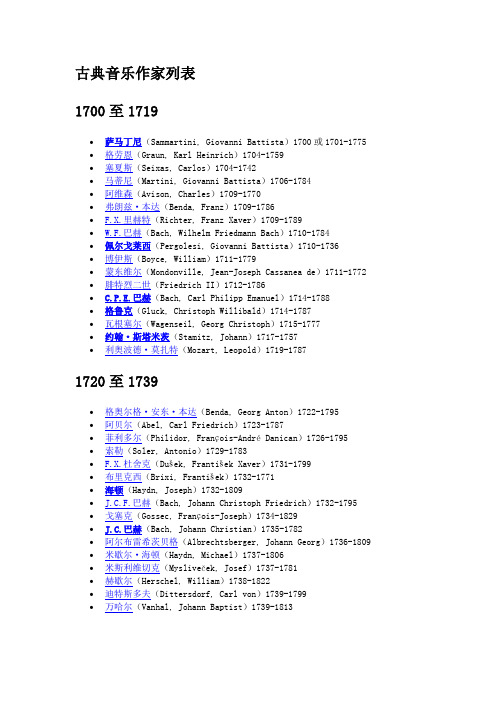
古典音乐作家列表1700至1719∙萨马丁尼(Sammartini, Giovanni Battista)1700或1701-1775 ∙格劳恩(Graun, Karl Heinrich)1704-1759∙塞夏斯(Seixas, Carlos)1704-1742∙马蒂尼(Martini, Giovanni Battista)1706-1784∙阿维森(Avison, Charles)1709-1770∙弗朗兹·本达(Benda, Franz)1709-1786∙ F.X.里赫特(Richter, Franz Xaver)1709-1789∙W.F.巴赫(Bach, Wilhelm Friedmann Bach)1710-1784∙佩尔戈莱西(Pergolesi, Giovanni Battista)1710-1736∙博伊斯(Boyce, William)1711-1779∙蒙东维尔(Mondonville, Jean-Joseph Cassanea de)1711-1772 ∙腓特烈二世(Friedrich II)1712-1786∙ C.P.E.巴赫(Bach, Carl Philipp Emanuel)1714-1788∙格鲁克(Gluck, Christoph Willibald)1714-1787∙瓦根塞尔(Wagenseil, Georg Christoph)1715-1777∙约翰·斯塔米茨(Stamitz, Johann)1717-1757∙利奥波德·莫扎特(Mozart, Leopold)1719-17871720至1739∙格奥尔格·安东·本达(Benda, Georg Anton)1722-1795∙阿贝尔(Abel, Carl Friedrich)1723-1787∙菲利多尔(Philidor, François-André Danican)1726-1795∙索勒(Soler, Antonio)1729-1783∙ F.X.杜舍克(Dušek, František Xaver)1731-1799∙布里克西(Brixi, František)1732-1771∙海顿(Haydn, Joseph)1732-1809∙J.C.F.巴赫(Bach, Johann Christoph Friedrich)1732-1795 ∙戈塞克(Gossec, François-Joseph)1734-1829∙J.C.巴赫(Bach, Johann Christian)1735-1782∙阿尔布雷希茨贝格(Albrechtsberger, Johann Georg)1736-1809 ∙米歇尔·海顿(Haydn, Michael)1737-1806∙米斯利维切克(Mysliveček, Josef)1737-1781∙赫歇尔(Herschel, William)1738-1822∙迪特斯多夫(Dittersdorf, Carl von)1739-1799∙万哈尔(Vanhal, Johann Baptist)1739-18131740至1759∙帕伊谢洛(Paisiello, Giovanni)1740-1816∙博凯里尼(Boccherini, Luigi)1743-1805∙卡尔·斯塔米茨(Stamitz, Carl)1745-1801∙科策卢(Kozeluch, Leopold)1747-1818∙奇马罗萨(Cimarosa, Domenico) 1749-1801∙罗塞蒂(Rosetti, Antonio)1750-1792∙安东·斯塔米茨(Stamitz, Anton)1750-1798∙萨列里(Salieri, Antonio)1750-1825∙博尔特尼扬斯基(Bortniansky, Dimtry)1751-1825∙克莱门蒂(Clementi, Muzio) 1752-1832∙马丁-索勒(Martín y Soler, Vicente)1754-1806∙克劳斯(Kraus, Joseph Martin)1756-1792∙莫扎特(Mozart, Wolfgang Amadeus)1756-1791∙帕维尔·弗拉尼茨基(Vranický, Pavel)1756-1808∙普莱耶尔(Pleyel, Ignaz)1757-1831∙克罗默尔(Krommer, Franz)1759-18311760至1779∙杜舍克(Dussek, Jan Ladislav)1760-1812∙凯鲁比尼(Cherubini, Luigi)1760-1842∙安东宁·弗拉尼茨基(Vranický, Antonín)1761-1820∙但齐(Danzi, Franz)1763-1826∙吉罗维茨(Gyrowetz, Adalbert)1763-1850∙莱巴(Ryba, Jakub Jan)1765-1815∙苏斯迈尔(Süßmayr, Franz Xaver)1766-1803∙贝多芬(Beethoven, Ludwig van)1770-1827∙雷哈(Reicha, Anton)1770-1836∙路易·斐迪南亲王(Prince Louis Ferdinand of Prussia)1772-1806 ∙托马谢克(Tomášek, Václav)1774-1850∙韦瑟(Weyse, Christoph Ernst Friedrich)1774-1842∙布瓦尔迪厄(Boieldieu, François-Adrien)1775-1834∙彭坦波(Bomtempo, João Domingos)1775-1842∙克鲁赛尔(Crusell, Bernhard Henrik)1775-1838∙胡梅尔(Hummel, Johann Nepomuk)1778-1837∙索尔(Sor, Fernando)1778-18391780至1799∙迪亚贝利(Diabelli, Anton)1781-1858∙奥柏(Auber, Daniel)1782-1871∙菲尔德(Field, John)1782-1837∙帕格尼尼(Paganini, Niccolò)1782-1840∙翁斯洛(Onslow, George)1784-1853∙里斯(Ries, Ferdinand)1784-1838∙施波尔(Spohr, Louis)1784-1859∙卡尔克布雷纳(Kalkbrenner, Friedrich)1785-1849∙库劳(Kuhlau, Friedrich)1786-1832∙韦伯(Weber, Carl Maria von)1786-1826∙阿里亚加(Arriaga, Juan Crisóstomo)1786-1806∙车尔尼(Czerny, Carl)1791-1857∙埃罗尔德(Hérold, Ferdinand)1791-1833∙梅耶贝尔(Meyerbeer, Giacomo)1791-1864∙沃日谢克(Voříšek, Jan Václav )1791-1825∙ F.X.W.莫扎特(Mozart, Franz Xaver Wolfgang)1791-1844 ∙罗西尼(Rossini, Gioachino)1792-1868∙莫谢莱斯(Moscheles, Ignaz)1794-1870∙马施纳(Marschner, Heinrich)1795-1861∙贝瓦尔德(Berwald, Franz)1796-1868∙勒韦(Loewe, Carl)1796-1869∙多尼采蒂(Donizetti, Gaetano)1797-1848∙舒伯特(Schubert, Franz)1797-1828∙阿莱维(Halévy, Jacques Fromental)1799-18621800至1809∙贝利尼(Bellini, Vincenzo)1801-1835∙卡利沃达(Kalivoda, Jan)1801-1866∙兰纳(Lanner, Joseph)1801-1843∙洛尔青(Lortzing, Albert)1801-1851∙夏尔·德·贝里奥(Beriot, Charles de)1802-1870∙亚当(Adam, Adolphe)1803-1856∙白辽士(Berlioz, Hector)1803-1869∙拜厄(Beyer, Ferdinand)1803-1863∙格林卡(Glinka, Mikhail)1804-1857∙老约翰·史特劳斯(Strauss, Johann I)1804-1849∙J.P.E.哈特曼(Hartmann, Johan Peter Emilius)1805-1900 ∙范妮·门德尔松(Mendelssohn, Fanny)1805-1847∙阿里亚加(Arriaga, Juan Crisóstomo)1806-1826∙弗里德里希·布尔格缪勒(Burgmüller, Friedrich)1806-1874 ∙巴尔夫(Balfe, Michael William)1808-1870∙孟德尔颂(Mendelssohn-Bartholdy, Felix)1809-1847 1810至1819∙诺伯特·布尔格缪勒(Burgmüller, Norbert)1810-1836 ∙肖邦(Chopin, Frédéric)1810-1849∙艾凯尔(Erkel, Ferenc)1810-1893∙尼古拉(Nicolai, Otto)1810-1849∙舒曼(Schumann, Robert)1810-1856∙希勒(Hiller, Ferdinand)1811-1885∙李斯特(Liszt, Franz)1811-1886∙托马(Thomas, Ambroise)1811-1896∙弗洛托(Flotow, Friedrich von)1812-1883∙塔尔贝格(Thalberg, Sigismond)1812-1871∙阿尔康(Alkan, Charles-Valentin)1813-1888∙达尔戈梅日斯基(Dargomyzhsky, Alexander)1813-1869 ∙弗赖(Fry, William Henry)1813-1864∙海勒(Heller, Stephen)1813-1888∙威尔第(Verdi, Giuseppe)1813-1901∙瓦格纳(Wagner, Richard)1813-1883∙恩斯特(Ernst, Heinrich Wilheim)1814-1865∙亨泽尔特(Henselt, Adolf von)1814-1889∙福尔克曼(Volkmann, Robert)1815-1883∙马蒙泰尔(Marmontel, Antoine François)1816-1898 ∙加德(Gade, Niels)1817-1890∙古诺(Gounod, Charles)1818-1893∙哈农(Hanon, Charles-Louis)1819-1900∙莫纽什科(Moniuszko, Stanisław)1819-1872∙奥芬巴赫(Offenbach, Jacques)1819-1880∙克拉拉·舒曼(Schumann, Clara)1819-1896∙苏佩(Suppè, Franz von)1819-18951820至1829∙维厄当(Vieuxtemps, Henri)1820-1881∙博泰西尼(Bottesini, Giovanni)1821-1889∙弗兰克(Franck, César)1822-1890∙拉夫(Raff, Joachim)1822-1882∙拉罗(Lalo, Édouard)1823-1892∙布鲁克纳(Bruckner, Anton)1824-1896∙科内利乌斯(Cornelius, Peter)1824-1874∙赖内克(Reinecke, Carl)1824-1910∙(Smetana, Bedřich)1824-1884∙小约翰·施特劳斯(Strauss, Johann II)1825-1899∙明库斯(Minkus, Ludwig)1826-1917∙约瑟夫·施特劳斯(Strauss, Josef)1827-1870∙巴吉尔(Bargiel, Woldemar)1828-1897∙戈特沙尔克(Gottschalk, Louis Moreau)1829-1869∙安东·鲁宾斯坦(Rubinstein, Anton)1829-1894 1830至1839∙戈德马克(Goldmark, Karl)1830-1915∙莱谢蒂茨基(Leschetizky, Theodor)1830-1915∙雅达松(Jadassohn, Salomon)1831-1901∙约阿希姆(Joachim, József )1831-1907∙扎伊茨(Zajc, Ivan)1832-1914∙鲍罗丁(Borodin, Alexander)1833-1887∙勃拉姆斯(Brahms, Johannes)1833-1897∙伯努瓦(Benoit, Peter)1834-1901∙居伊(Cui, César)1835-1918∙德莱塞克(Draeseke, Felix)1835-1913∙尼古拉·鲁宾斯坦(Rubinstein, Nikolai)1835-1881∙圣-桑(Saint-Saèns, Camille)1835-1921∙爱德华·施特劳斯(Strauss, Eduard)1835-1916∙亨里克·维尼亚夫斯基(Wieniawski, Henryk)1835-1880 ∙德利布(Délibes, Léo)1836-1891∙巴拉基列夫(Balakirev, Mily)1837-1910∙提奥多·杜布瓦(Dubois, Théodore)1837-1924∙亚历山大·吉尔芒(Guilmant, Alexandre)1837-1911∙比才(Bizet, Georges)1838-1875∙布鲁赫(Bruch, Max)1838-1920∙达维多夫(Davidov, Karl)1838-1889∙穆索尔斯基(Mussorgsky, Modest)1839-1881∙佩因(Paine, John Knowles)1839-1906∙赖因贝格尔(Rheinberger, Joseph)1839-19011840至1849∙格茨(Goetz, Hermann)1840-1876∙斯文森(Svendsen, Johan)1840-1911∙柴可夫斯基(Tchaikovsky, Pyotr Ilyich)1840-1893∙夏布里埃(Chabrier, Emmanuel)1841-1894∙德沃夏克(Dvořák, Antonín)1841-1904∙佩德雷尔(Pedrell, Felip)1841-1922∙(Sgambati, Giovanni)1841-1914∙博伊托(Boito, Arrigo)1842-1918∙马斯内(Massenet, Jules)1842-1912∙萨利文(Sullivan, Arthur)1842-1900∙格里格(Grieg, Edvard)1843-1907∙哈梅里克(Hamerik, Asger)1843-1923∙赫尔佐根伯格(Herzogenberg, Heinrich von)1843-1900∙波佩尔(Popper, David)1843-1913∙里姆斯基-科萨科夫(Rimsky-Korsakov, Nikolai)1844-1908 ∙萨拉萨蒂(Sarasate, Pablo de)1844-1908∙维多尔(Widor, Charles-Marie)1844-1937∙福莱(Fauré, Gabriel)1845-1924∙诺斯科夫斯基(Noskowski, Zygmunt)1846-1909∙巴克-格伦达尔(Backer-Grøndahl, Agathe)1847-1907∙罗伯特·富克斯(Fuchs, Robert)1847-1927∙迪帕克(Duparc, Henri)1848-1933∙帕里(Parry, Hubert)1848-1918∙戈达(Godard, Benjamin)1849-18951850至1859∙菲比赫(Fibich, Zdeněk)1850-1900∙沙尔文卡(Scharwenka, Xaver)1850-1924∙丹第(D'Indy, Vincent)1851-1931∙汉斯·胡伯(Huber, Hans)1852-1921∙塔雷加(Tárrega, Francisco)1852-1909∙斯坦福(Stanford, Charles Villiers)1852-1924∙富特(Foote, Arthur)1853-1937∙梅萨热(Messager, André)1853-1929∙查德威克(Chadwick, George)1854-1931∙洪佩尔丁克(Humperdinck, Engelbert)1854-1921∙雅纳切克(Janáček, Leoš)1854-1928∙莫什科夫斯基(Moszkowski, Moritz)1854-1925∙苏萨(Sousa, John Philip)1854-1932∙肖松(Chausson, Ernest)1855-1899∙里亚多夫(Lyadov, Anatoly)1855-1914∙隆特根(Röntgen, Julius)1855-1932∙卡亚努斯(Kajanus, Robert)1856-1933∙马尔图齐(Martucci, Giuseppi)1856-1909∙(Sinding, Christian)1856-1941∙塔涅耶夫(Taneyev, Sergei)1856-1915∙夏米娜德(Chaminade, Cécile)1857-1944∙埃尔加(Elgar, Edward)1857-1934∙莱翁卡瓦洛(Leoncavallo, Ruggiero)1857-1919∙普契尼(Puccini, Giacomo)1858-1924∙罗特(Rott, Hans)1858-1884∙伊萨伊(Ysaÿe, Eugène)1858-1931∙费尔斯特(Foerster, Josef Bohuslav)1859-1951∙伊波里托夫-伊凡诺夫(Ippolitov-Ivanov, Mikhail)1859-1935 ∙克伦格尔(Klengel, Julius)1859-1933∙利亚普诺夫(Lyapunov, Sergei)1859-19241860至1869∙阿尔贝尼兹(Albeniz, Isaac)1860-1909∙古斯塔夫·夏庞蒂埃(Charpentier, Gustave)1860-1956∙麦克道威尔(Macdowell, Edward)1860-1908∙马勒(Mahler, Gustav)1860-1911∙帕德雷夫斯基(Paderewski, Ignacy Jan)1860-1941∙雷兹尼切克(Reznicek, Emil von)1860-1945∙沃尔夫(Wolf, Hugo)1860-1903∙阿连斯基(Arensky, Anton)1861-1906∙卡托瓦(Catoire, Georgy)1861-1926∙图伊勒(Thuille, Ludwig)1861-1907∙波尔曼(Boèllmann, Léon)1862-1897∙德彪西(Debussy, Claude)1862-1911∙戴留斯(Delius, Frederick)1862-1934∙埃马努埃尔(Emmanuel, Maurice)1862-1938∙迪彭布罗克(Diepenbrock, Alphons)1862-1921∙赫里夫(Greef, Arthur de)1862-1940∙阿尔伯托·威廉斯(Williams, Alberto)1862-1952∙马斯卡尼(Mascagni, Pietro)1863-1945∙帕克(Horatio, Parker)1863-1919∙皮尔纳(Pierné, Gabriel)1863-1937∙魏因加特纳(Weingartner, Felix)1863-1942∙达尔伯特(d'Albert, Eugen)1864-1932∙路易斯·格拉斯(Glass, Louis)1864-1936∙格列恰尼诺夫(Gretchaninov, Alexander)1864-1956∙哈尔沃森(Halvorsen, Johan)1864-1935∙罗帕茨(Ropartz, Guy)1864-1955∙理查·施特劳斯(Strauss, Richard)1864-1949∙杜卡斯(Dukas, Paul)1865-1935∙格拉祖诺夫(Glazunov, Alexander)1865-1936∙马尼亚尔(Magnard, Albéric)1865-1914∙尼尔森(Nielsen, Carl)1865-1931∙西贝柳斯(Sibelius, Jean)1865-1957∙布索尼(Busoni, Ferruccio)1866-1924∙卡林尼科夫(Kalinnikov, Vasily)1866-1901∙萨蒂(Satie, Erik)1866-1925∙比奇夫人(Beach, Amy)1867-1944∙焦尔达诺(Giordano, Umberto)1867-1948∙格拉纳多斯(Granados, Enrique)1867-1916∙凯什兰(Koechlin, Charles)1867-1950∙彼得森-伯格(Peterson-Berger, Wilhelm)1867-1942 ∙班托克(Bantock, Granville)1868-1946∙奥斯卡·梅利康托(Merikanto, Oskar)1868-1924∙罗萨斯(Rosas, Juventino)1868-1894∙席林斯(Schillings, Max von)1868-1933∙维阿纳·达·莫塔(Vianna da Motta, José)1868-1948 ∙阿尔弗雷德·希尔(Hill, Alfred)1869-1960∙普菲茨纳(Pfitzner, Hans)1869-1949∙鲁塞尔(Roussel, Albert)1869-1937∙齐格弗里德·瓦格纳(Wagner, Siegfried)1869-1930 1870至1879∙戈多夫斯基(Godowsky, Leopold)1870-1938∙莱哈尔(Lehár, Franz)1870-1948∙勒克(Lekeu, Guillaume)1870-1894∙诺瓦克(Novák, Vítězslav)1870-1949∙施米特(Schmitt, Florent)1870-1958∙奥斯卡·施特劳斯(Straus, Oscar)1870-1954∙图内米尔(Tournemire, Charles)1870-1939∙维尔纳(Vierne, Louis)1870-1937∙策姆林斯基(Zemlinsky, Alexander von)1871-1942∙阿尔芬(Alfvén, Hugo)1872-1960∙斯克里亚宾(Scriabin, Alexander)1872-1915∙塞弗拉克(Séverac, Déodat de)1872-1921∙斯丹哈默(Stenhammar, Wilhelm)1872-1927∙瓦西连科(Vasilenko, Sergei)1872-1956∙沃恩-威廉斯(Vaughan Williams, Ralph)1872-1958∙戎冈(Jongen, Joseph)1873-1953∙拉赫玛尼诺夫(Rachmaninoff, Sergei)1873-1943∙雷格(Reger, Max)1873-1916∙尼古拉·切列普宁(Tcherepnin, Nikolai)1873-1945 ∙哈恩(Hahn, Reynaldo)1874-1947∙霍尔斯特(Holst, Gustav)1874-1934∙艾夫斯(Ives, Charles)1874-1951∙施密特(Schmidt, Franz)1874-1939∙勋伯格(Schönberg, Arnold)1874-1951∙苏克(Suk, Josef)1874-1935∙格里埃尔(Gliére, Reinhold)1875-1954∙凯特尔比(Ketèlbey, Albert)1875-1959∙克莱斯勒(Kreisler, Fritz)1875-1962∙梅拉尔丁(Melartin, Erkki)1875-1937∙拉威尔(Ravel, Maurice)1875-1937∙魏茨(Wetz, Richard)1875-1935∙卡萨尔斯(Casals, Pablo)1876-1973∙法雅(Falla, Manuel de)1876-1946∙卡洛维茨(Karłowicz, Mieczysław)1876-1909∙拉格尔斯(Ruggles, Carl)1876-1971∙沃尔夫-费拉里(Wolf-Ferrari, Ermanno)1876-1948 ∙波特凯维茨(Bortkiewicz, Sergei)1877-1952∙多赫南伊(Dohnanyi, Ernő)1877-1960∙卡格-埃勒特(Karg-Elert, Sigfrid)1877-1933∙卡普莱(Caplet, André)1878-1925∙帕姆格伦(Palmgren, Selim)1878-1951∙施雷克尔(Schreker, Franz)1878-1934∙布里奇(Bridge, Frank)1879-1941∙康特卢布(Canteloube, Joseph)1879-1957∙克哈斯(Cras, Jean)1879-1932∙哈蒂(Harty, Hamilton)1879-1941∙艾尔兰(John, Ireland)1879-1962∙雷斯庇基(Respighi, Ottorino)1879-19361880至1889∙布洛赫(Bloch, Ernest)1880-1959∙福尔兹(Foulds, John)1880-1939∙梅特纳(Medtner, Nicolai)1880-1951∙皮泽蒂(Pizzetti, Ildebrando)1880-1968∙巴托克(Bartók, Béla)1881-1945∙埃内斯库(Enescu, George)1881-1955∙米亚斯科夫斯基(Myaskovsky, Nicolai)1881-1950 ∙罗斯拉维茨(Roslavets, Nicolai)1881-1944∙格兰杰(Grainger, Percy)1882-1961∙豪尔(Hauer, Josef Matthias)1882-1959∙柯达伊(Kodály, Zoltán)1882-1967∙马利皮耶罗(Malipiero, Gian Francesco)1882-1971∙约瑟夫·马克思(Marx, Joseph)1882-1964∙庞塞(Ponce, Manuel)1882-1948∙斯特拉文斯基(Stravinsky, Igor)1882-1971∙席曼诺夫斯基(Szymanowski, Karol)1882-1937 ∙图里纳(Turina, Joaquín)1882-1949∙巴克斯(Bax, Arnold)1883-1953∙卡塞拉(Casella, Alfredo)1883-1947∙卡洛米里斯(Kalomiris, Manolis)1883-1962∙瓦雷兹(Varèse, Edgar)1883-1965∙韦伯恩(Webern, Anton)1883-1945∙阿萨菲耶夫(Asafyev, Boris)1884-1949∙鲍文(Bowen, York)1884-1961∙格里费斯(Griffes, Charles)1884-1920∙巴里奥斯(Barrios, Agustín)1885-1944∙贝尔格(Berg, Alban)1885-1935∙迪普雷(Dupré, Marcel)1886-1971∙富特文格勒(Furtwängler, Wiilhelm)1886-1954 ∙舍克(Schoeck, Othmar)1886-1957∙山田耕筰(Yamada, Kósçak)1886-1965∙阿特伯格(Atterberg, Kurt)1887-1974∙娜迪亚·布朗热(Boulanger, Nadia)1887-1979 ∙马代托亚(Madetoja, Leevi)1887-1947∙托赫(Toch, Ernst)1887-1964∙瓦伦(Valen, Fartein)1887-1952∙维拉-罗伯斯(Villa-Lobos, Heitor)1887-1959 ∙迪雷(Durey, Louis)1888-19791890至1899∙伊贝尔(Ibert, Jacques)1890-1962∙马丁(Martin, Frank)1890-1974∙马尔蒂努(Martinů, Bohuslav)1890-1959∙布利斯(Bliss, Arthur)1891-1975∙普罗科菲耶夫(Prokofiev, Sergei)1891-1953∙奥涅格(Honegger, Arthur)1892-1955∙米约(Milhaud, Darius)1892-1974∙塔耶芙尔(Tailleferre, Germaine)1892-1983∙阿布西尔(Absil, Jean)1893-1974∙阿瑟·本杰明(Benjamin, Arthur)1893-1960∙莉莉·布朗热(Boulanger, Nadia)1893-1918∙哈巴(Hába, Alois)1893-1973∙兰戛尔(Langgaard, Rued)1893-1952∙阿尔·梅利康托(Merikanto, Aarre)1893-1958∙蒙波(Mompou, Federico)1893-1987∙皮佩尔(Pijper, Willem)1894-1947∙辟斯顿(Piston, Walter)1894-1976∙舒尔霍夫(Schulhoff, Erwin)1894-1942∙沃洛克(Warlock, Peter)1894-1930∙卡斯泰尔诺沃-泰代斯科(Castelnuovo-Tedesco, Mario)1895-1968 ∙戈托瓦茨(Gotovac, Jakov)1895-1982∙欣德米特(Hindemith, Paul)1895-1963∙莱库纳(Lecuona, Ernesto)1895-1963∙利亚托申斯基(Lyatoshynsky, Borys)1895-1968∙奥尔夫(Orff, Carl)1895-1982∙格哈德(Gerhard, Robert)1896-1970∙汉森(Hanson, Howard)1896-1982∙塞欣斯(Sessions, Roger)1896-1985∙汤姆森(Thomson, Virgil)1896-1989∙魏因贝格尔(Weinberger, Jaromír)1896-1967∙考埃尔(Cowell, Henry)1897-1965∙科恩戈尔德(Korngold, Enrich)1897-1957∙米戈农(Mignone, Francisco)1897-1986∙萨弗鲁德(Sæverud, Ha rald)1897-1992∙汤斯曼(Tansman, Alexandre)1897-1986∙艾斯勒(Eisler, Hanns)1898-1962∙格什温(Gershwin, George)1898-1937∙哈里斯(Harris, Roy)1898-1979∙乌尔曼(Ullmann, Viktor)1898-1944∙奥里克(Auric, Georges)1899-1983∙查维斯(Chávez, Carlos)1899-1978∙哈斯(Haas, Pavel)1899-1944∙莱夫斯(Leifs, Jón)1899-1968∙普朗克(Poulenc, Francis)1899-1963∙雷维尔塔斯(Revueltas, Silvestre)1899-1940∙齐尔品(Tcherepnin, Alexander)1899-1977∙弗拉季格罗夫(Vladigerov, Pancho)1899-1978。
古典音乐

古典音乐分类:音乐世界标签:协奏曲奏鸣曲作曲家古典音乐欣赏文化古典音乐有广义、狭义之分。
广义是指西洋古典音乐,那些从西方中世纪开始至今的、在欧洲主流文化背景下创作的音乐,主要因其复杂多样的创作技术和所能承载的厚重内涵而有别于通俗音乐和民间音乐。
狭义指古典主义音乐,是1750-1820年这一段时间的欧洲主流音乐,又称维也纳古典乐派。
此乐派三位最著名的作曲家是海顿、莫扎特和贝多芬。
【名称定义】古典音乐丛书CLASSICAL MUSIC,中文翻译成“古典音乐”,有人认为“古典”给人的感觉有古董、古板的味道,故改称“经典音乐”。
也有人根据牛津英文辞典里对古典的定义,in traditional and serious style,而称其为“严肃音乐”。
于是,“古典音乐”又被戴上了“严肃”的帽子,让人更不敢靠近。
但下此定义的人一定没有好好查字典,因为serious的第二条义项是这样给出定义的:(指书、音乐等)启发思考的,不仅为消遣的。
因此我们知道原来古典音乐不同于流行音乐的地方是它内涵深刻,能发人深思,更能使人高尚,免于低俗。
再来看一下朗文辞典对古典音乐的解释:music that people consider serious and that has been popular for a long time。
可见,古典音乐是历经岁月考验,久盛不衰,为众人喜爱的音乐。
古典音乐是一个独立的流派,艺术手法讲求洗练,追求理性地表达情感。
当人们听到巴赫、贝多芬、莫扎特、舒伯特等古典音乐家的音乐作品时,它带给人们的不仅仅是优美的旋律,充满意趣的乐思,还有最真挚的情感,或宁静、典雅,或震撼、鼓舞,或欢喜、快乐,或悲伤、惆怅……【历史沿革】古典音乐丛书说到欧洲古典音乐,不能不提到中世纪伊丽莎白时期,格里高利时期的音乐,其中,占主导地位的是宗教音乐!当时的人们对基督的信仰与崇拜,直接影响到了当时社会的政治与音乐,当时的音乐,只是纯粹的宗教用途,只限于在教堂中演唱,没有乐器,但是,却对今后的音乐发展起到了重要的作用!到了1450年,欧洲音乐开始进入了文艺复兴时期,因为当时的欧洲政治的不稳定,教廷的威信与势力开始衰弱,资产阶级萌芽,为了适应当时社会的发展与人们的新思想,音乐开始宣扬以人为本的思想,所以在各个领域里都开始了文艺复兴运动,也就是在那时,欧洲传统的大小调式逐渐形成!欧洲到了1600年开始,进入了一个大发展的时期——巴洛克时期,那时候不仅产生了象大家所熟知的巴赫,亨德尔等伟大的作曲家,歌剧,协奏曲,奏鸣曲等题材相继被创造发展出来。
莫扎特作文英文及翻译

莫扎特作文英文及翻译英文:Mozart is one of the most famous composers in history, and his music still resonates with people today. As a musician myself, I have always been fascinated by his work and the impact he has had on the world of classical music.One of the things that makes Mozart's music so special is his ability to convey emotion through his compositions. Whether it's the joy and playfulness of his "Eine Kleine Nachtmusik" or the haunting beauty of his "Requiem," his music has the power to evoke strong feelings in listeners.Another aspect of Mozart's music that I admire is his technical skill. He was a master of form and structure, and his music is incredibly intricate and complex. Yet, despite this complexity, his music is still accessible and enjoyable to listen to.Mozart's influence on the world of classical music cannot be overstated. He paved the way for future composers and helped to shape the genre as we know it today. His legacy lives on, and his music will continue to inspire and delight generations to come.中文:莫扎特是历史上最著名的作曲家之一,他的音乐至今仍然深受人们喜爱。
另类的人名翻译
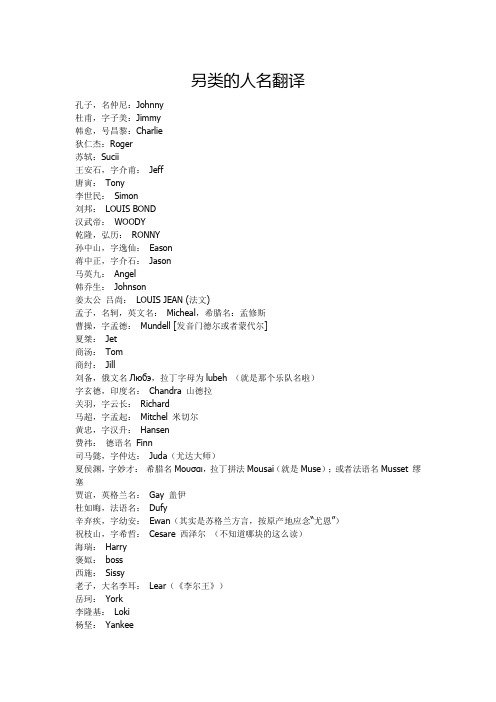
另类的人名翻译孔子,名仲尼:Johnny杜甫,字子美:Jimmy韩愈,号昌黎:Charlie狄仁杰:Roger苏轼:Sucii王安石,字介甫:Jeff唐寅:Tony李世民:Simon刘邦:LOUIS BOND汉武帝:WOODY乾隆,弘历:RONNY孙中山,字逸仙:Eason蒋中正,字介石:Jason马英九:Angel韩乔生:Johnson姜太公吕尚:LOUIS JEAN (法文)孟子,名轲,英文名:Micheal,希腊名:孟修斯曹操,字孟德:Mundell [发音门德尔或者蒙代尔]夏桀:Jet商汤:Tom商纣:Jill刘备,俄文名Любэ,拉丁字母为lubeh (就是那个乐队名啦)字玄德,印度名:Chandra 山德拉关羽,字云长:Richard马超,字孟起:Mitchel 米切尔黄忠,字汉升:Hansen费祎:德语名Finn司马懿,字仲达:Juda(尤达大师)夏侯渊,字妙才:希腊名Μουσαι,拉丁拼法Mousai(就是Muse);或者法语名Musset 缪塞贾谊,英格兰名:Gay 盖伊杜如晦,法语名:Dufy辛弃疾,字幼安:Ewan(其实是苏格兰方言,按原产地应念“尤恩”)祝枝山,字希哲:Cesare 西泽尔(不知道哪块的这么读)海瑞:Harry褒姒:boss西施:Sissy老子,大名李耳:Lear(《李尔王》)岳珂:York李隆基:Loki杨坚:Yankee诸葛亮,字孔明:Cumin荀彧,字文若:Wenger(法语)谢安:Sean杜甫:Duff朱熹:Jusy朱棣:Judy林彪:Tiger Woods。
英文经典:音乐家阿波罗

英文经典Apollo the Musician音乐家阿波罗(Myths of Greece and Rome)1⑴It is said that ⑵on a certain occasion ⑶Pan had the['sə:tn]某个,确信的[ə'keiʒən]场合据说有一次,潘曾轻率地要求与阿波罗一较琴艺——向这位temerity ⑷to compare his music ⑸with that of Apollo⑹and to [ti'meriti]鲁莽[kəm'pɛə]相比,匹敌[(+with)]lyre(古希腊的一种七弦竖琴)之神挑战演奏技巧。
challenge the god of the lyre ⑺to a trial of skill.⑻The challenge ['tʃælindʒ]挑战质疑['traiəl]考验试验审判 a trial of 较量挑战被接受was accepted, ⑼and Tmolus, ⑽the mountain-god, ⑾was 了。
山神提摩勒斯被选为公断人。
chosen umpire. ⑿The senior took his seat ⒀and cleared away ['tʃəuzn]['ʌmpaiə] 仲裁人裁判['si:njə]高级的年长的这位长者在他的位置上就座,撩开他耳边the trees ⒁from his ears to listen. ⒂At a given signal['signəl]信号的树枝,以便聆听。
比赛开始,2 ⑴Pan blew on his pipes, ⑵and with his rustic melody[paips]笛子管['rʌstik]乡下的粗俗的['melədi]旋律潘吹起他的笛子beauty ['bju:ti]优美的粗糙的旋律⑶gave great satisfaction ⑷to himself ⑸and his faithful[,sætis'fækʃən] 满意乐事['feiθfəl]忠实的却令他自己和刚巧在座的忠贞的follower Midas, ⑹who happened to be present.⑺Then Tmolus['hæpənd]碰巧['preznt]出席的随从麦达斯都得意洋洋。
八大音乐家标志词

八大音乐家标志词本文将介绍八位标志性的音乐家,他们对音乐界造成了深远的影响。
以下是他们的简要介绍:1. 贝多芬(Ludwig van Beethoven): 来自德国的作曲家和钢琴家,被誉为古典音乐之王。
他的作品包括交响乐、钢琴协奏曲等。
2. 莫扎特(Wolfgang Amadeus Mozart): 奥地利的作曲家和钢琴家,以其优雅的作品而闻名。
他的音乐风格多样,包括交响乐、歌剧等。
3. 肖邦(Frédéric Chopin): 波兰浪漫主义作曲家,擅长钢琴作品,尤其以其美妙的练曲和华尔兹著称。
4. 舒伯特(Franz Schubert): 奥地利浪漫主义作曲家,创作大量钢琴曲和声乐作品。
他的作品充满了浪漫情感和诗意。
5. 理查德·瓦格纳(Richard Wagner): 德国作曲家和戏剧家,对音乐剧产生了重大影响。
他的歌剧作品如《尼伯龙根的指环》被誉为史诗般的作品。
6. 约翰·斯特劳斯二世(Johann Strauss II): 奥地利作曲家,以其轻快的华尔兹和进行曲而闻名。
他的音乐鼓舞人心,广受欢迎。
7. 乔治·格什温(George Gershwin): 美国作曲家和钢琴家,将爵士乐与古典音乐结合,开创了新的音乐风格。
他的作品《蓝色狂想曲》成为经典之作。
8. 约翰·列侬(John Lennon): 英国音乐家、词曲创作人和歌手,是披头士乐队的成员之一。
他的歌曲充满了社会意义和艺术创新。
这些音乐家各具特色,他们的作品影响了音乐历史的发展,并给我们留下了珍贵的音乐遗产。
古典音乐家解析
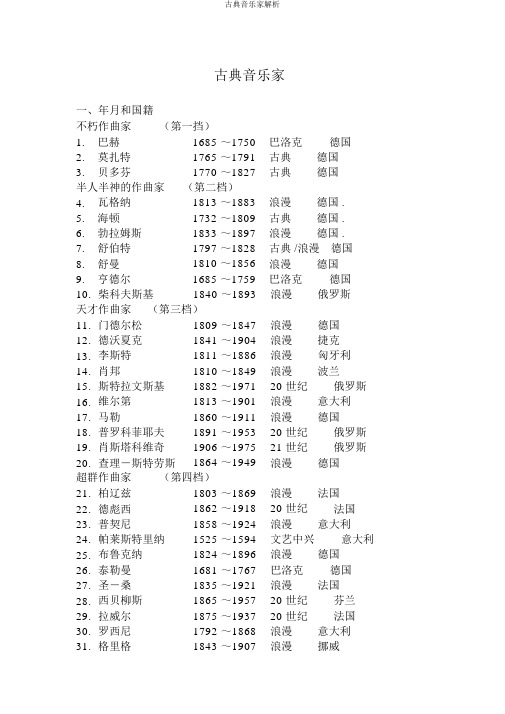
古典音乐家一、年月和国籍不朽作曲家(第一挡)1.巴赫1685 ~1750巴洛克德国2.莫扎特1765 ~1791古典德国3.贝多芬1770 ~1827古典德国半人半神的作曲家(第二档)4.瓦格纳1813 ~1883浪漫德国 .5.海顿1732 ~1809古典德国 .6.勃拉姆斯1833 ~1897浪漫德国 .7.舒伯特1797 ~1828古典 /浪漫德国8.舒曼1810 ~1856浪漫德国9.亨德尔1685 ~1759巴洛克德国10.柴科夫斯基1840 ~1893浪漫俄罗斯天才作曲家(第三档)11.门德尔松1809 ~1847浪漫德国12.德沃夏克1841 ~1904浪漫捷克13.李斯特1811 ~1886浪漫匈牙利14.肖邦1810 ~1849浪漫波兰15.斯特拉文斯基1882 ~197120 世纪俄罗斯16.维尔第1813 ~1901浪漫意大利17.马勒1860 ~1911浪漫德国18.普罗科菲耶夫1891 ~195320 世纪俄罗斯19.肖斯塔科维奇1906 ~197521 世纪俄罗斯20.查理-斯特劳斯1864 ~1949浪漫德国超群作曲家(第四档)21.柏辽兹1803 ~1869浪漫法国22.德彪西1862 ~191820 世纪法国23.普契尼1858 ~1924浪漫意大利24.帕莱斯特里纳1525 ~1594文艺中兴意大利25.布鲁克纳1824 ~1896浪漫德国26.泰勒曼1681 ~1767巴洛克德国27.圣-桑1835 ~1921浪漫法国28.西贝柳斯1865 ~195720 世纪芬兰29.拉威尔1875 ~193720 世纪法国30.罗西尼1792 ~1868浪漫意大利31.格里格1843 ~1907浪漫挪威32.格鲁克1714 ~1787后巴洛克 /古典德国33.亨德密特1895 ~196320 世纪德国34.蒙特威尔第1567 ~1643 巴洛克意大利35.巴托克1881 ~194520 世纪匈牙利36.弗郎克1822 ~1890浪漫法国37.维瓦尔第1678 ~1741巴洛克意大利38.比才1838 ~1875浪漫法国39.穆索尔斯基1839 ~1881浪漫俄罗斯40.拉摩1683 ~1764巴洛克法国41.福莱1845 ~1924浪漫法国42.里姆斯基-可萨科夫 1844 ~1908 浪漫俄罗斯43.唐尼采第1797 ~1848浪漫意大利44.沃恩-威廉斯1872 ~195820 世纪英国45.斯美塔纳1824 ~1884浪漫捷克46.约翰-施特劳斯1825 ~1899浪漫德国47.韦伯1786 ~1826前浪漫期间德国48.亚那切克1854 ~192820 世纪捷克49.库普兰1668 ~1733巴洛克法国50.鲍罗丁1833 ~1887浪漫俄罗斯二、一句话评论1.巴赫——西方艺术的巨人2.莫扎特——最优异的天分音乐奇才3.贝多芬——激烈而激情的不朽吼怒者4.瓦格纳——最伟大的戏剧作曲家5.海顿——近乎不朽的交响曲和弦乐四重奏之父6.勃拉姆斯——最纯正的浪漫主义交响曲和最顶尖的德国艺术歌曲作曲家7.舒伯特——古典/浪漫主义的钢琴和旋律的抒怀天才,德国歌曲之王8.舒曼——浪漫主义的化身,歌曲、钢琴曲和交响乐的诗一般的大师9.亨德尔——巴洛克旋律专家,清唱剧天才10.柴科夫斯基——俄罗斯优异作曲,旋律大师11.门德尔松——浪漫主义神童,优美、典雅的钢琴曲和交响曲作家12.德沃夏克——在 3 位列入排行榜中居首位的捷克人,旋律家13.李斯特——最优异的钢琴家,交响诗的发明人14.肖邦——钢琴之王15.斯特拉文斯基—— 20 世纪最优异的作曲家,前锋派领头人16.威尔第——最受敬爱的歌剧作曲家17.马勒—— 9 首交响曲和歌曲作者18.普罗科菲耶夫—— 20 世纪不协和音的俄罗斯人19.肖斯塔科维奇——苏维埃头号作曲家20.理查 ?施特劳斯——“新音乐”的前驱,9 首有名交响诗的作者21.柏辽兹——急进的浪漫主义者,交响曲问题专家22.德彪西——第一位印象派作曲家,歌曲、钢琴和管弦乐作品23.普契尼——威尔第此后的意大利歌剧大师24.帕莱斯特里纳——文艺中兴期间天主教教堂音乐大师25.布鲁克纳——维也纳7 位交响曲作曲家中的第 6 位26.泰勒曼——巴洛克期间有3000 部作品的大师27.圣 ?桑——法国极具魅力的歌剧和交响诗作者28.西贝柳斯——最早的芬兰作曲家,不单是民族主义者29.拉威尔——优雅而谨慎的法国人,往常与印象派德彪西合作30.罗西尼——威尔第前与唐尼采第同为意大利歌剧大师31.格里格——挪威头号作曲家、民族主义者32.格鲁克——后巴洛克 /古典主义歌剧改革家33.亨德密特—— 20 世纪 5 位“新音乐”不协和音作曲家之一34.蒙特威尔第——巴洛克期间和声学的“现代主义者、”第一位歌剧作曲家35.巴托克——匈牙得20 世纪不协和音作曲家36.弗朗克——平和、心灵美,歌曲、清唱剧、交响曲等的作者37.维瓦尔第——巴洛克期间小提琴多产作曲家38.比才——《卡门》等少量几部作品的作者39.穆索尔斯基——最完全的民族主义和最无畏的俄罗斯民族主义者40.拉摩——法国初期头号拨弦古钢琴天才、理论家和歌剧专家41.福雷——怡人的法国歌曲和室内乐作者42.里姆斯基 -科萨科夫——俄罗斯民族主义者中最有艺术修养的人43.唐尼采第——威尔第以前意大利歌剧界中仅次于罗西尼的人44.沃恩 ?威廉斯—— 20 世纪英公民族主义者45.斯美塔纳——捷克民族主义音乐的奠定人46.约翰 ?施特劳斯——圆舞曲之王47.韦伯——第一位真实的浪漫主义者,联接格鲁克和瓦格纳的德国歌剧作曲家48.亚那切克—— 20 世纪捷克人, 3 位入捷克人中最有现代色彩者49.库普兰——法国巴洛克期间拨弦古钢琴大师50.鲍罗丁——音调优美的俄罗斯民族主义者音乐合集├【专辑】纯音乐黄金古典 300 CD01│01 阿尔华诺凡 - 慢板│02 巴达尔维斯卡 - 少女的祷告│03巴赫 - D 小调触技曲与赋格曲│04巴赫 - E 调前奏曲│05巴赫 - G 弦上的咏叹调│06 巴赫 - 爱的协奏曲│07 巴赫 - 布蓝登堡舞曲│08 巴赫 - 布蓝登堡协奏曲│09 巴赫 - 长笛奏鸣曲│10 巴赫 - 船歌│11 巴赫 - 古钢琴协奏曲第三乐章│12 巴赫 - 舞乐组曲│13 巴赫 - 雅克的迦可琳眼泪│14 巴赫 - 耶苏,人们仰望愉悦│15 巴赫 - 云雀四重奏│16贝多芬 - (命运)第一乐章有活力的快板│17贝多芬 - (命运)第二乐章流利的行板│18贝多芬 - (命运)第三乐章快板│19贝多芬 - (英豪)第一乐章热忱的快板│20贝多芬 - (英豪)第二乐章葬礼进行曲很慢的柔板│21贝多芬 - (英豪)第三乐章风趣曲开朗的快板│22贝多芬 - (英豪)第四乐章终曲很快的快板│23贝多芬 - F 大调浪漫曲│24 贝多芬- 悲怆奏鸣曲│25 贝多芬- 欢喜颂│26 贝多芬- 田园交响曲│27 贝多芬- 弦乐三重奏第一乐章│28 贝多芬- 献给爱丽丝│29 贝多芬- 小步舞曲│30 贝多芬- 月光奏鸣曲├【专辑】纯音乐黄金古典 300 CD02│01 埃尔加- “谜”变奏曲│02 埃尔加- 爱的礼赞│03 埃尔加- 威风凛冽进行曲│04 安德松- 火光│05 奥芬巴哈- 天堂与地狱│06 柏辽兹- 想象交响曲之赴弄刑进行曲│07 柏辽兹- 想象交响曲之梦幻热忱│08 柏辽兹- 想象交响曲之女巫安眠昼夜会之梦│09 柏辽兹- 想象交响曲之野外风景│10 柏辽兹- 想象交响曲之舞会│11 柏辽兹- 拉科西进行曲│12 柏辽兹- 罗马狂欢节序曲│13 鲍罗定- 鞑靼舞曲│14 比才 - 阿莱城的姑娘│15 比才 - 大黄蜂飞舞│16 比才 - 卡门│17 比才 - 卡门序曲│18 比才 - 西班牙斗牛士│19 比才 - 小步舞曲│20 波恰尼利- 弦乐五重奏第一乐章│21 伯恩斯坦- 豪勇七蛟龙│22 勃拉姆斯- 大学庆典│23 勃拉姆斯- 第三号交响乐│24 勃拉姆斯- 摇篮曲│25 勃拉姆斯- 圆舞曲第 11 首│26 勃拉姆斯- 圆舞曲第 12 首│27 德彪西- 牧神午后│28 德彪西- 月光│29 德彪西- 月光曲│30 德彪西- 棕发少女├【专辑】纯音乐黄金古典 300 CD03│01 柴可夫斯基- 睡佳人圆舞曲│02 柴可夫斯基- 1812 序曲│03 柴可夫斯基- 船歌│04 柴可夫斯基- 第六号交响曲│05 柴可夫斯基- 第一号钢琴协奏曲│06 柴可夫斯基- 胡桃夹子进行曲│07 柴可夫斯基- 胡桃夹子圆舞曲│08 柴可夫斯基- 罗密欧与朱莉叶想象曲序曲│09 柴可夫斯基- 洛可可大提琴协奏曲│10 柴可夫斯基- 那波里舞曲│11 柴可夫斯基- 秋之歌│12 柴可夫斯基- 如歌的行板│13 柴可夫斯基- 睡佳人序曲│14 柴可夫斯基- 四个小天鹅│15 柴可夫斯基- 天鹅湖序曲场景│16 柴可夫斯基- 惟有一颗孤单的心│17 柴可夫斯基- 无词歌│18 柴可夫斯基- 西班牙舞曲│19 柴可夫斯基- 小夜曲│20 柴可夫斯基- 匈牙利舞曲│21 柴可夫斯基- 匈牙利舞曲第五号│22 柴可夫斯基- 意大利随想曲│23 柴可夫斯基- 郁闷小夜曲│24 多普勒- 匈牙利田园想象曲│25 多斯特尔- 维也纳飞翔员进行曲│26 佛汉威廉斯- 绿袖子想象曲│27 格里格- 晨曲│28 格里格- 钢琴协奏曲│29 格里格- 小夜曲│30 格里格- 摇篮曲├【专辑】纯音乐黄金古典 300 CD04│01 德沃夏克- 金婚进行曲│02 德沃夏克- 母亲教我的歌│03 德沃夏克- 斯拉夫舞曲│04 德沃夏克- 斯拉夫舞曲第一号 C 大调│05 德沃夏克- 无言曲│06 德沃夏克- 风趣曲│07 德沃夏克- 月亮颂│08 德沃夏克- 自新大陆│09 夫契克- 佛罗伦萨进行曲│10 盖希文- 蓝色狂想曲│11 格里埃尔- 俄罗斯水兵舞│12 格林卡- 鲁斯兰与柳德米拉序曲│13 格鲁克- 旋律│14 格罗菲- 大峡谷组曲│15 格什温- 蓝色狂想曲│16 古诺 - 爱的礼赞│17 古诺 - 小夜曲│18 古塞克- 嘉禾舞曲│19 哈恰图良- 马刀舞曲│20 海顿 - C 大调弦乐四重奏《皇帝》第一乐章│21 海顿 - d 大调钢琴协奏曲第一乐章│22 海顿 - c 大调大提琴协奏曲第三乐章│23 海顿 - 小夜曲│24 韩德尔- 萨巴女王驾到│25 亨德尔- 水上音乐│26 华尔顿- 加冕进行曲│27 霍特斯- 行星组曲│28 卡尔曼- 乡间少儿圆舞曲│29 卡尔欧菲- 布兰诗歌│30 柯达伊- 音乐时钟├【专辑】纯音乐黄金古典 300 CD05│01 拉威尔- 悲鸟│02 拉威尔- 波丽路│03 拉威尔- 福尔拉纳舞曲│04 拉威尔- 海上孤舟│05 拉威尔- 利戈东舞曲│06 拉威尔- 托卡塔│07 拉威尔- 翁丹│08 拉威尔- 小步舞曲│09 拉威尔- 夜蛾│10 柯普兰- 大家信号曲│11 科特比- 波斯市场│12 克莱斯勒- 爱的愉悦│13 克莱斯勒- 爱的伤心│14 克莱斯勒- 吉卜塞人随想曲│15 克莱斯勒- 漂亮的罗丝玛丽│16 克莱斯勒- 小夜曲│17 拉赫马尼诺夫- 钢琴协奏曲 2 号│18 拉赫马尼诺夫- 帕格尼尼狂想曲│19 拉赫马尼诺夫- 帕格尼尼主题变奏曲│20 拉赫马尼诺夫- 前奏曲│21 莱哈尔- 金银圆舞曲│22 莱斯比基- 拂晓的朱丽亚喷泉│23 雷可莱- 小鼓│24 李斯特- 爱恋的梦│25 李斯特- 傍晚时的想象│26 李斯特- 小星星变奏曲│27 李斯特- 钟│28 鲁宾斯坦- F 调旋律│29 鲁宾斯坦- 浪漫曲│30 鲁宾斯坦- 旋律├【专辑】纯音乐黄金古典 300 CD06│01 门德尔松- 乘着歌声的翅膀│02 门德尔松- 春之歌│03 门德尔松 - 第四交响曲意大利开朗的快板│04 门德尔松 - 第四交响曲意大利萨尔塔雷格│05 门德尔松 - 婚礼旱灾行曲│06 门德尔松 - 成婚进行曲│07 门德尔松- 无言歌│08 门德尔松- 仲夏夜之梦│09 门德尔松- 仲夏夜之梦谐谑曲│10 里查斯特劳斯- 查拉图斯特拉如是说里│11 罗西尼- 塞尔维亚剪发师│12 罗西尼- 威廉退尔序曲│13 洛塔 - 罗密欧与朱丽叶│14 马蒂尼- 爱的欢喜│15 马勒 - 第一号交响曲“巨人”│16 马瑞 - 金婚式│17 马斯奈- 深思曲│18 马斯奈- 领袖│19 马斯奈- 泰伊斯冥想曲│20 马斯奈- 朱尔的哀思│21 帕赫贝尔- 卡农│22 民歌 - 鸽子│23 民歌 - 红河谷│24 民歌 - 魂断蓝桥│25 民歌 - 绿袖子│26 民歌 - 安全夜│27 民歌 - 三套车│28 民歌 - 桑踏露琪亚│29 民歌 - 我的太阳│30 民歌 - 野玫瑰├【专辑】纯音乐黄金古典 300 CD07│01 莫扎特- c 大调长笛奏协曲第二乐章│02 莫扎特- c 大调第五小提琴协奏曲第三乐章│03 莫扎特- c 小调第三小提琴协奏曲│04 莫扎特- D 大调小号协奏曲│05 莫扎特- G 大调第三小提琴协奏曲│06 莫扎特- 单簧管协奏曲第一乐章│07 莫扎特- 德国舞曲│08 莫扎特- 第 4 号交响曲│09 莫扎特- 第 21 号钢琴协奏曲│10 莫扎特- 第 23 号钢琴交响曲│11 莫扎特- 第 25 号交响曲│12 莫扎特- 第 29 号交响曲│13 莫扎特- 第 35 号交响曲│14 莫扎特- 第 39 号交响曲降 E 大调│15 莫扎特- 第 40 号交响曲│16 莫扎特- 第二号横笛协奏曲│17 莫扎特- 法国号协奏曲│18 莫扎特- 费加罗的婚礼│19 莫扎特- 钢琴三重奏第一乐章│20 莫扎特- 钢琴协奏曲│21 莫扎特- 钢琴协奏曲第 40 号│22 莫扎特- 横笛协奏曲 1 号│23 莫扎特- 横笛协奏曲二号│24 莫扎特- 降 B 大调三重奏│25 莫扎特- 浪漫小夜曲│26 莫扎特- 魔笛│27 莫扎特- 圣诗│28 莫扎特- 竖笛五重奏 A 大调│29 莫扎特- 土耳其进行曲│30 莫扎特- 喜游曲├【专辑】纯音乐黄金古典 300 CD08│01 舒伯特- F 小调瞬时音乐│02 舒伯特- 军队进行曲│03 舒伯特- 乐与之时│04 舒伯特- 菩提树│05 舒伯特- 圣母颂│06 舒伯特- 玩具兵进行曲│07 舒伯特- 未达成的交响乐│08 舒伯特- 小夜曲│09 舒伯特- 摇篮曲│10 舒伯特- 圆舞曲│11 舒伯特- 鳟鱼五重奏│12 莫扎特- 小步舞曲│13 莫扎特- 小夜曲 1│14 莫扎特- 小夜曲 2│15 莫扎特- 小夜曲 3│16 莫扎特- 小夜曲 4│17 莫扎特- 摇篮曲│18 莫扎特- 一个音乐玩笑│19 穆梭斯基- 基辅城门│20 穆梭斯基- 博览会之画│21 普罗科菲耶夫- 分别前的罗密欧与朱莉叶│22 普罗科菲耶夫- 罗密欧与朱莉叶│23 普罗利菲夫- 交响组曲“基杰中尉”│24 齐雷尔- 进来闲逛圆舞曲│25 萨蒂 - 第一号吉姆培迪诺│26 萨拉萨蒂- 漂泊者之歌│27 萨拉萨蒂- 那伐拉舞曲│28 圣桑 - 第三号交响曲“管风琴”│29 圣桑 - 婚礼蛋糕│30 圣桑 - 天鹅├【专辑】纯音乐黄金古典 300 CD09│01 舒曼 - 梦幻曲│02 斯特劳斯- 电闪雷鸣波尔卡│03 苏佩 - 轻骑兵序曲│04 苏佩 - 诗人和农民序曲│05 苏沙 - 永久的星条旗│06 托塞里- 小夜曲│07 瓦格纳- 婚礼进行曲│08 瓦格纳- 女武神│09 威尔第- 阿伊达进行曲│10 威尔第- 吉他奏鸣曲│11 威尔第- 曼陀铃协奏曲│12 威尔第- 四时│13 威廉斯- 奥林匹克鼓号曲│14 韦伯 - 邀舞│15 西贝流斯- 伤心圆舞曲│16 西贝流斯- 芬兰颂│17 西贝流斯- 黄泉的天鹅│18 西贝流斯- 卡列里亚组曲│19 肖邦 - #C 小调即兴想象曲│20 肖邦 - #F 大调船歌│21 肖邦 - C 小调夜曲│22 肖邦 - F 大调夜曲│23 肖邦 - 第三 11 号圆舞曲│24 肖邦 - 第三波兰舞曲“军队”│25 肖邦 - 降 A 大调第三号叙事曲│26 肖邦 - 分别曲│27 肖邦 - 马祖卡│28 肖邦 - 小夜曲│29 肖邦 - 英豪波兰舞曲│30 肖邦 - 雨滴├【专辑】纯音乐黄金古典 300 CD10│01 耶佩斯- 爱的浪漫史│02 伊万诺维奇- 多瑙河之波圆舞曲│03 约翰 .施特劳斯 - 爆炸波尔卡│04 约翰 .施特劳斯 - 蝙蝠│05 约翰 .施特劳斯 - 城市与农村波尔卡│06 约翰 .施特劳斯 - 春之声圆舞曲│07 约翰 .施特劳斯 - 皇帝圆舞曲│08 约翰 .施特劳斯 - 加快│09 约翰 .施特劳斯 - 克拉普芬公园波尔卡│10 约翰 .施特劳斯 - 拉德斯基进行曲│11 约翰 .施特劳斯 - 来自奥地利的祝愿│12 约翰 .施特劳斯 - 蓝色多瑙河│13 约翰 .施特劳斯 - 蓝色多瑙河舞曲│14 约翰 .施特劳斯 - 滑冰圆舞曲│15 约翰 .施特劳斯 - 南方的玫瑰│16 约翰 .施特劳斯 - 情歌│17 约翰 .施特劳斯 - 深情圆舞曲│18 约翰 .施特劳斯 - 维也纳丛林故事│19 约翰 .施特劳斯 - 香槟波尔加│20 约翰 .施特劳斯- 向空中射击(快波尔卡)│21 约翰 .施特劳斯- 新(拨弦波尔卡)│22 约翰 .施特劳斯 - 匈牙利之恋│23 约瑟夫 .拉纳 - 当巴赫村圆舞曲│24 约瑟夫 .拉纳 - 猎人骑马奔驰│25 约瑟夫 .拉纳 - 五首圆舞曲│26 约瑟夫 .施特劳斯- 度假旅游(快波尔卡)│27 约瑟夫 .施特劳斯- 股票交易所(波尔卡)│28 约瑟夫 .施特劳斯 - 欢喜的人生│29 约瑟夫 .施特劳斯- 生机盎然圆舞曲│30 约瑟夫 .施特劳斯- 自远方来。
艺术家文学家译名原名对照表
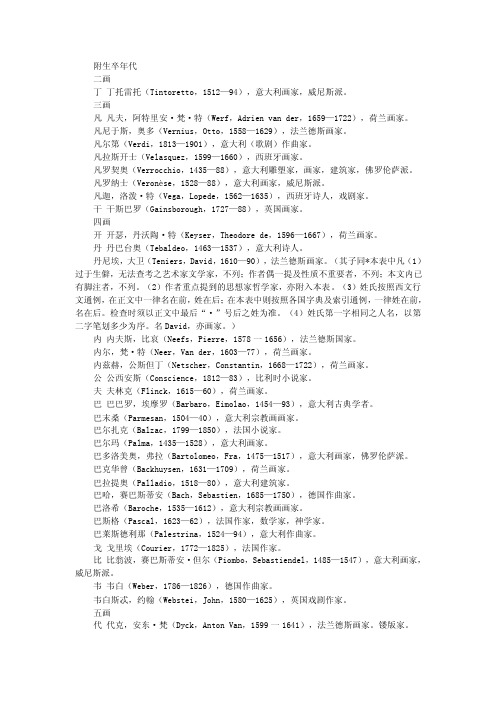
附生卒年代二画丁丁托雷托(Tintoretto,1512—94),意大利画家,威尼斯派。
三画凡凡夫,阿特里安·梵·特(Werf,Adrien van der,1659—1722),荷兰画家。
凡尼于斯,奥多(Vernius,Otto,1558—1629),法兰德斯画家。
凡尔第(Verdi,1813—1901),意大利(歌剧)作曲家。
凡拉斯开士(Velasquez,1599—1660),西班牙画家。
凡罗契奥(Verrocchio,1435—88),意大利雕塑家,画家,建筑家,佛罗伦萨派。
凡罗纳士(Veronèse,1528—88),意大利画家,威尼斯派。
凡迦,洛泼·特(Vega,Lopede,1562—1635),西班牙诗人,戏剧家。
干干斯巴罗(Gainsborough,1727—88),英国画家。
四画开开瑟,丹沃陶·特(Keyser,Theodore de,1596—1667),荷兰画家。
丹丹巴台奥(Tebaldeo,1463—1537),意大利诗人。
丹尼埃,大卫(Teniers,David,1610—90),法兰德斯画家。
(其子同*本表中凡(1)过于生僻,无法查考之艺术家文学家,不列;作者偶一提及性质不重要者,不列;本文内已有脚注者,不列。
(2)作者重点提到的思想家哲学家,亦附入本表。
(3)姓氏按照西文行文通例,在正文中一律名在前,姓在后;在本表中则按照各国字典及索引通例,一律姓在前,名在后。
检查时须以正文中最后“·”号后之姓为准。
(4)姓氏第一字相同之人名,以第二字笔划多少为序。
名David,亦画家。
)内内夫斯,比哀(Neefs,Pierre,1578一1656),法兰德斯国家。
内尔,梵·特(Neer,Van der,1603—77),荷兰画家。
内兹赫,公斯但丁(Netscher,Constantin,1668—1722),荷兰画家。
- 1、下载文档前请自行甄别文档内容的完整性,平台不提供额外的编辑、内容补充、找答案等附加服务。
- 2、"仅部分预览"的文档,不可在线预览部分如存在完整性等问题,可反馈申请退款(可完整预览的文档不适用该条件!)。
- 3、如文档侵犯您的权益,请联系客服反馈,我们会尽快为您处理(人工客服工作时间:9:00-18:30)。
[1880-1951][俄]梅特纳(MEDTNER, NICOLAI)
[1866-1914][典]奥林(TOR AULIN)
[1867-1948][意]焦尔达诺(GIORDANO, UMBERTO)
[1869-1949][德]普菲茨纳(PFITZNER, HANS)
[02]新浪漫主义(NEOROMANTICISM)
[1896-1982][美]汉森(HOWARD HANSON)
[1896-1989][美]维吉尔·汤姆森(VIRGIL THOMSON)
[1905-1998][英]蒂皮特(MICHAEL TIPPETT)
[1925-2003][意]贝里奥(LUCIANO, BERIO)
[1947-][美]约翰·亚当斯(JOHN COOLIDGE ADAMS)
[10]偶然音乐(ALEATORIC MUSIC)
[1912-][美]约翰·凯奇(JOHN CAGE)
[1861-1926][俄]卡托瓦(CATOIRE, GEORGY)
[1863-1937][法]皮尔纳(PIERNé, GABRIEL)
[1864-1935][挪]哈尔沃森(HALVORSEN, JOHAN)
[1864-1936][丹]路易斯·格拉斯(GLASS, LOUIS)
[03]新民族乐派
[1854-1928][捷]雅那切克(LEOS JANACEK)
[1872-1958][英]沃恩·威廉斯(RALPH VAUGHAN WILLIAMS)
[1874-1934][英]霍尔斯特(GUSTAV THEODORE HOLST)
[1874-1954][美]艾夫斯(ARLESEDWARD, IVES)
[1935-][美]拉蒙特·扬(LA MONTE YOUNG)
[1935-][美]赖利(TERRY RILEY)
[1936-][美]史蒂夫?里奇(STEVE REICH)
[1937-][美]菲利普·格拉斯(PHILIP GLASS)
[1944-][英]迈克尔?纽曼(MICHAEL NYMAN)
[1865-1935][法]保罗·杜卡(PAUL DUKAS)
[1866-1925][法]埃里克·萨蒂(ERIK SATIE)
[1875-1937][法]莫里斯·拉威尔(MAURICE RAVEL)
[1876-1946][西]马努埃尔·德·法雅(MANUEL DE FALLA)
[1892-1983][法]泰费尔(GERMAINE TAILLEFERRE)
[1899-1963][法]普朗克(FRANCIS POULENC)
[1899-1983][法]奥里克(GEORGES AURIC)
[05]象征主义
[1872-1915][俄]史克里亚宾(ALEXANDER SCRIABIN)
[1883-1947][意]卡塞拉(ALFREDO CASELLA)
[1891-1953][俄]谢尔盖·普罗科菲耶夫(SERGEI PROKOFIEV)
[1895-1963][德]保罗·欣德米特(PAUL HINDEMITH)
[1895-1982][德]卡尔·奥尔夫(CARL ORFF)
台湾版的古典音乐家人名翻译
文艺复兴时期[1400-1600]
[1]勃艮第乐派(第一尼德兰乐派)
[1397-1474][法]纪尧姆·迪费(DUFAY, GUILLAUME)
[1397-1474][法]纪尧姆·迪费(DUFAY, GUILLAUME):《迪费歌曲与器乐音乐专辑》
[1871-1942][德]策姆林斯基(ZEMLINSKY, ALEXANDER VON)
[1872-1927][典]威廉·施丹哈默(STENHAMMAR, WILHELM)
[1873-1916][德]雷格(REGER, MAX)
[1875-1954][俄]格里埃尔(GLIéRE, REINHOLD)
[2]弗莱芒乐派(第二尼德兰乐派)
[1410-1497][比]约翰内斯·奥克冈(JOHANNES OCKEGHEM)
[1435-1511][比]约翰内斯·廷克托里斯(JOHANNES TINCTORIS)
[1457-1505][比]雅各布·奥布雷赫特(JACOB OBRECHT) 1457或
[1881-1945][匈]贝拉·巴托克(BELA BARTOK)
[1882-1961][澳]格兰杰(GRAINGER, PERCY)
[1882-1967][匈]柯达伊(KODALY ZOLTAN)
[1901-1999][西]罗德里戈(RODRIGO, JOAQUIN)
[1902-1983][英]威廉·沃尔顿(WILLIAM WALTON)
[1557-1612][意]加布里埃利(GIOVANNI GABRIELI)
[1567-1642][意]克劳迪奥·蒙特威尔地(CLAUDIO MONTEVERDI)
[1557-1612][意]加布里埃利(GIOVANNI GABRIELI):《圣乐交响曲 II,1615》
[1567-1642][意]克劳迪奥·蒙特威尔地(CLAUDIO MONTEVERDI):声乐作品
[1934-][英]马克斯韦尔·戴维斯(SIR PETER MAXWELL DAVIES)
[08]爵士风格作曲家
[1898-1937][美]乔治·格什温(GEORGE GERSHWIN)
[1930-][法]克劳德·波林(CLAUDE BOLLING)
[09]简约主义(MINIMALISM)
[1903-1978][苏]阿拉姆·伊里奇·哈恰图良(ARAM ILITCH KHATCHATURIAN)
[1904-1987][俄]卡巴列夫斯基(KABALEVSKY)
[3]、浪漫-现代过渡时期其他作曲家
[1872-1956][俄]瓦西连科(VASILENKO, SERGEI)
[07]先锋派
[1883-1965][法]瓦雷兹(EDGAR VARèSE)
[1908-1992][法]梅西安(OLIVIER MESSIAEN)
[1916- ][法]杜蒂耶(HENRI DUTILLEUX)
[1934-][英]贝特威斯尔(HARRISON BIRTWISTLE)
[1860-1945][奥]雷兹尼莱克(EMIL VON REZNICEK)
[1864-1949][德]理查德·斯特劳斯(RICHARD STRAUSS)
[1866-1924][意]布索尼(BUSONI, FERRUCCIO)
[1873-1943][俄]谢尔盖·瓦西里耶维奇·拉赫玛尼诺夫(SERGEI VASSILIEVITCH RACHMANINOFF)
[1867-1950][法]凯什兰(KOECHLIN, CHARLES)
[1868-1948][葡]维阿纳·达·莫塔(VIANNA DA MOTTA, JOSé)
[1860-1908][美]麦克道威尔(MACDOWELL, EDWARD)
[1860-1911][奥]古斯塔夫·马勒(GUSTAV MAHLER)
[1879-1936][意]奥托里诺·雷斯庇基(OTTORINO RESPIGHI)
[1883-1937][波]卡罗尔·西曼诺夫斯基(KAROL SZYMANOWSKI)
[1890-1962][法]伊贝尔(JACQUES IBERT)
[2]、浪漫现实主义
[1861-1906][俄]阿连斯基(ARENSKY, ANTON)
[1906-1975][苏]德米特里·德米特里耶维奇·肖斯塔科维奇(DMITRY DMITRIEVITCH SHOSTAKOVITCH)
[1909-1996][丹]霍尔姆波(HOLMBOE, VAGN)
[1913-1994][波]鲁托斯拉夫斯基(WITOLD LUTOS?AWSKI)
[1532-1594][比]奥兰多·德·拉絮斯(ORLANDE DE LASSUS)
[3]罗马乐派
[1525-1594][意]帕莱斯特里纳(GIOVANNI PIERLUIGI DA PALESTRINA)
[4]威尼斯乐派
[1532-1585][意]安德烈·加布里埃利(ANDREA GABRIELI)
[1881-1944][俄]罗斯拉维兹(NIKOLAI ROSLAVETS)
[06]表现主义(无调性,新维也纳乐派)
[1874-1951][奥]奥诺德·勋柏格(AUNOLD SCHONBERG)
[1883-1945][奥]安东?韦伯恩(ANTON WEBERN)
[1885-1935][奥]贝尔格(BERG ALBAN)
二十世纪现代音乐时期[1900-2000]
[01]新古典主义(新巴洛克)(NEOCLASSICISM)
[1869-1937][法]鲁塞尔(ALBERT ROUSSEL)
[1876-1948][意]埃尔曼诺·沃尔夫·费拉里(ERMANNO WOLF FERRARI)
[1882-1971][俄]伊戈尔·菲德洛维奇·斯特拉文斯基(IGOR FEDOROVITCH STRAVINSKY)
[1563-1626][英]道兰德(DOWLAND ,JOHN)
浪漫主义时期以后:
浪漫-现代过渡时期[born 1860-1880]
[1]、印象派
[1862-1918][法]克罗德·德彪西(CLAUDE DEBUSSY)
[1862-1934][英]戴留斯(FREDERICK DELIUS)
[1872-1960][典]阿尔芬(ALFVéN, HUGO)
